



|

|

|
|
2007/10, October Photofictional, A Daily Blog Posting By Bryan Costales
|
|
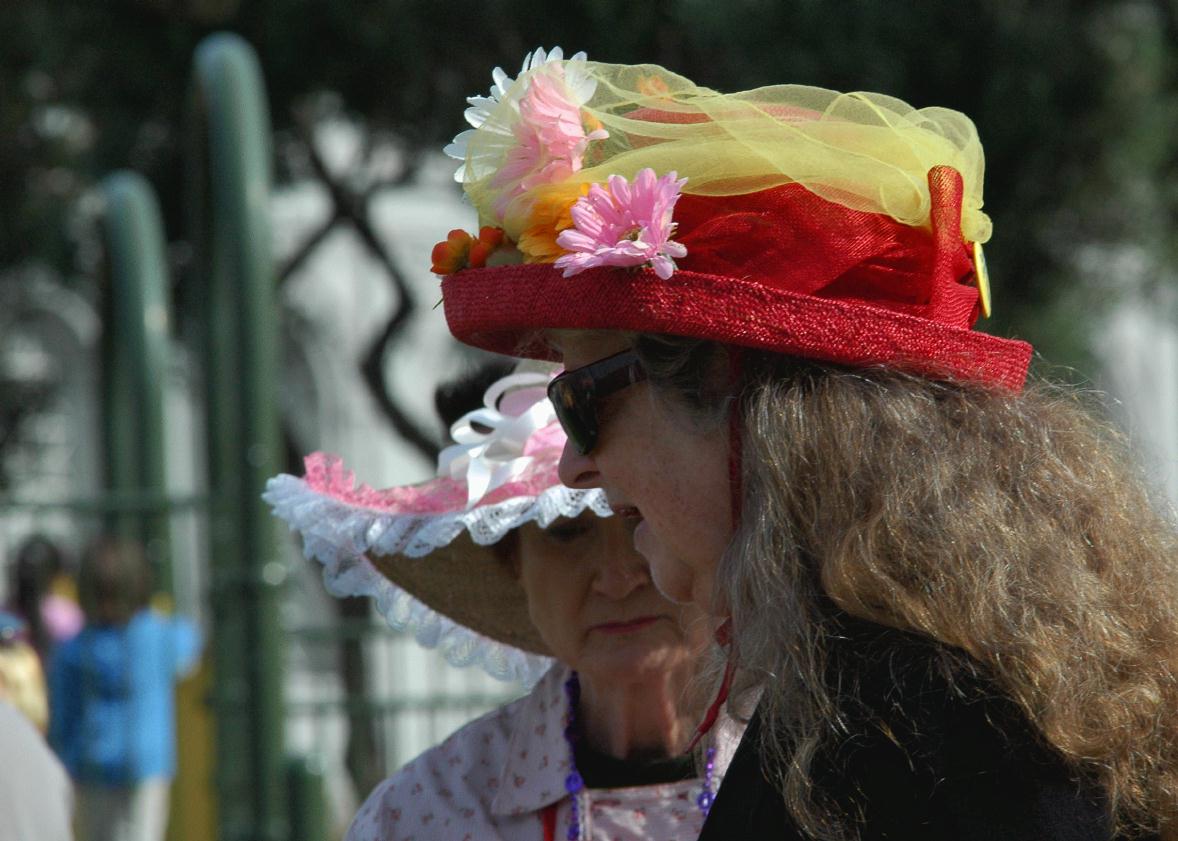 | |
|
Laura Tafts found a nice hat in a flea market. It fit
her perfectly and was only a buck. Inside the brim was
a small strip of tape with the word "haunted" written
in a delicate script.
Laura knew that Halloween was the next day so thought little of the label. Surely it must be just another Halloween gag. Bad weather prevented Laura from wearing her new hat until the following spring. She found it on a shelf in the hall closet. She put it on and turned to look at herself in the mirror. It looked lovely. Another woman, wearing a white hat, approached Laura from her right. Laura glimpsed the woman out of the corner of her eye, moving as if to collide. Laura gasped, surprised that there might be someone in her empty house. She looked. There was nobody there. She was alone in her own house and her hallway was quiet except for the ticking of the clock. Laura decided she'd had too much to drink the night before. Laura took off the hat and noticed once again the label inside with the word "haunted." She shrugged and said to herself, "A hat cannot be haunted." To walk to the shopping district, Laura had to cross a traffic circle where five roads intersected. She stood at the pedestrian crossing and waited for the light to change to a green hand. Laura mused about the sale that morning and wondered if the skirt she liked would still be on the rack and if it would be marked down. The pedestrian signal changed and Laura began to step off the curb. A woman wearing a white had approached Laura from her right. Laura just caught her out of the corner of her eye and stepped back to avoid colliding. Laura looked and there was nobody there. Just then a large truck roared through the pedestrian crossing barely missing Laura, the driver chatting on a cellphone. Laura took off the hat and waited for her heart to settle. After a while she calmed and began to wonder. "Does the label cause the haunting or does it merely notify the owner that the hat is haunted." An older woman walking two lovely large dogs walked up beside Laura. "Good morning," she said. "Good morning," Laura said, and had a thought. "Would you like a hat?" "It's a very pretty hat, are you sure you want to give it away?" "I'm positive," Laura said. She handed the hat to the old woman. They crossed together. Laura found out the woman's name was Bess. "Goodbye Bess," Laura called when they parted ways. Bess wore the hat that afternoon for a walk in the park. As she approached a tunnel in the park, Bess thought she saw a woman in a white hat approaching from her right. She saw the woman in the corner of her eye and stopped to avoid a collision. Bess's dogs started to bark. Bess looked and there was nobody on the path with her. The dogs barked viscously at nothing. It almost seemed to Bess that the dogs were barking at the woman in the hat who wasn't there. The barking of the dogs frightened two young men that had been hiding in the bushes. They had planned to rob the old woman and never expected such gentle looking dogs to bark like that. They abandoned their plan and fled back into the park. Bess brought the dogs under control. She removed the hat and wiped the sweat from her forehead. She was about to put the hat back on when she notice a label inside. It was a slip of tape with the word "haunted," on it. "Bunk," Bess said. She peeled off the piece of tape and dropped it into a nearby trash can.
The tape fell and landed on an empty plastic
water bottle. It wiggled as if it was alive and
stuck to the bottle.

 #BP20071030.jpg Add a comment or report a mistake
|
|
|
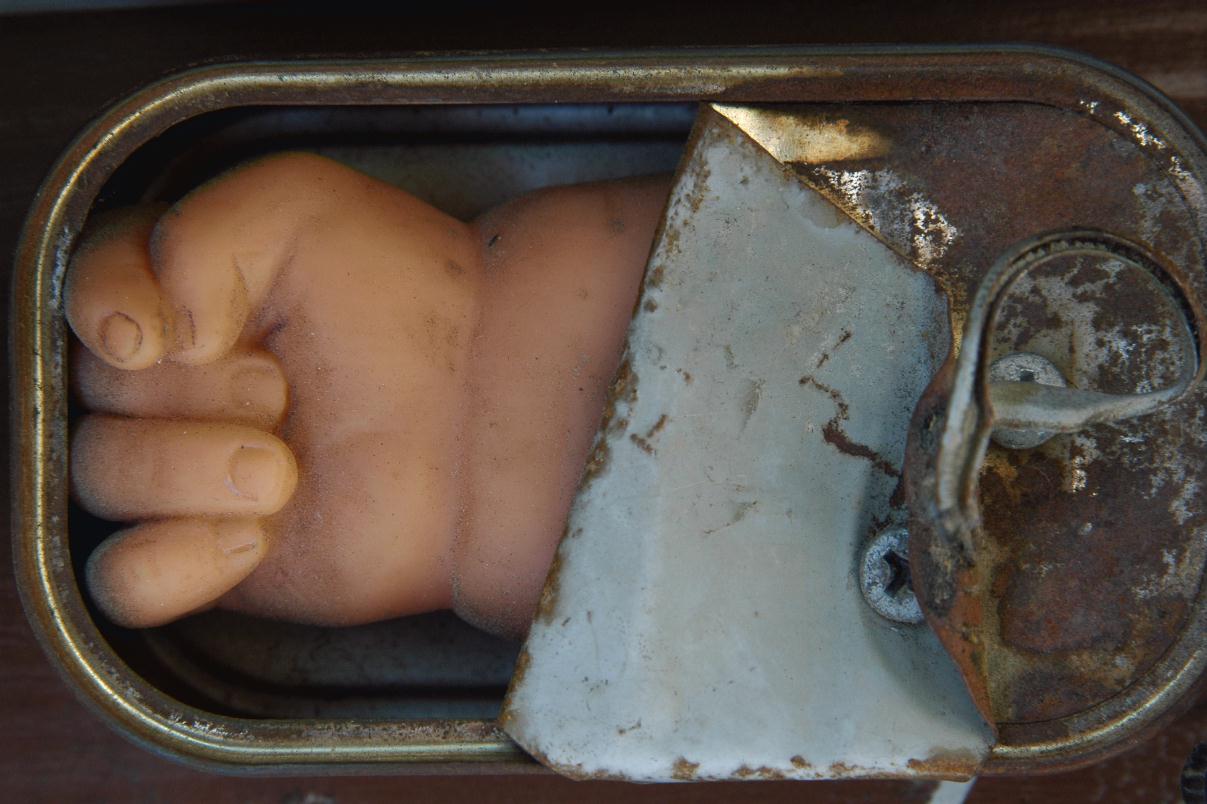 | |
|
There is an old joke that says, "You can tune a piano, but
you cannot tuna fish." This is not to say that it is a good
joke. Rather it is a pun --a play on the pronunciation and spelling
of words. One might argue that the difference between a joke and
a pun is like the difference between a smile and a kick in the
shin.
Jarden was a punster. He would crack a pun about almost anything and was therefore shunned by most of his friends. One day, while visiting a fortune teller, Jarden made the mistake of telling her a pun. She smiled a wicked smile at him and said, "Eat sardines. When you find your hand, you will have learned to stop telling puns." Jarden boarded the trolly to head home and went to pull his pass from his pocket but discoved his hand was missing. "My god," he said. In place of his hand was a clean stump. No stitches, no cuts, nothing, just no hand. Jarden walked back to find the fortune teller, but her shop was now the store front for a Japanese electronic store. Months passed. Every day after work Jarden would buy a tin of sardines and open it. Inside he would find only fish. At the coffee machine one morning, a co-employee of Jarden's made an odd comment. "Jarden," he said. "You know. I haven't heard you tell a pun in weeks." That very evening, Jarden found his hand in a tin of sardines. He looked at it, stunned. Then he blinked and the hand was gone. In its place Jarden saw only a tin full of sardines. Then an odd sensation like a breeze passing down his arm caused Jarden to look at his right hand. His hand had returned. He flexed it thoughtfully. It appeared good as new. The very next day, Jarden told a pun. (2007) Valencia Street, San Francisco • Photo Posted Tuesday, October 2, 2007 
 #BP20071002.jpg Add a comment or report a mistake
|
|
|
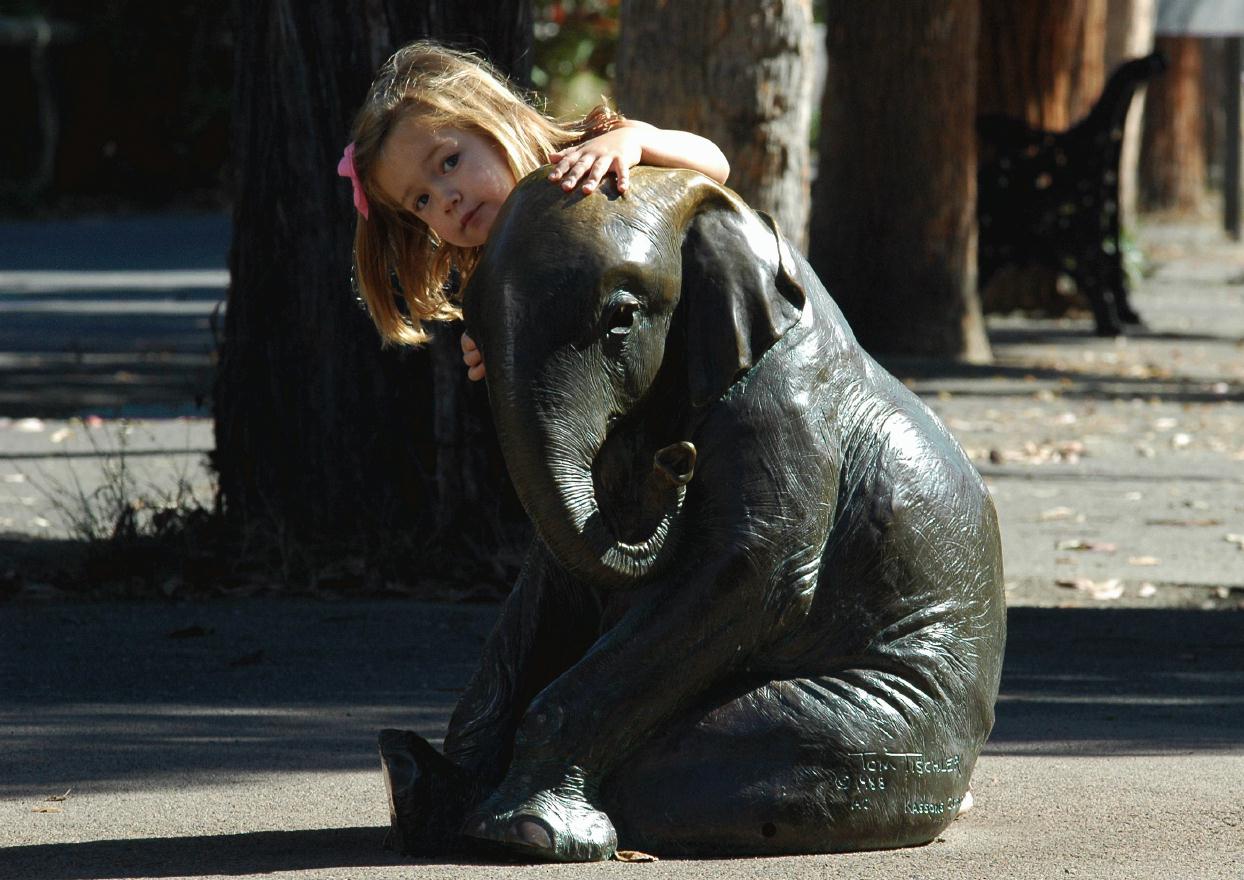 | |
|
"Where did I come from?" asked little Debby.
"We found you," her dad said. He rummaged through a pile of photographs and pulled out one showing Debby's older sister behind a metal elephant. "Here, Debby, look at this." Debby looked at the picture and laughed. "We went to the zoo and found your sister emerging from a metal elephant. We liked the way she looked and took her home." "Is that why she is fat? Because she came from an elephant?" "Now, Debby. We don't call your sister fat. We say chunky. You know that." "But all my friends call her fat." Her dad cleared his throat. "Do you want to know where we found you?" "Yes! Yes!" We were in France and went to the Louvre museum. We found you emerging from the statue of an angel. We liked the way you looked and took you home." "Do you have a picture?" "No, sorry. None of those pictures turned out. We think the airport x-rays ruined the film." "An angel?" "Yes. I think it was an angel. But let's ask your mom when she gets home." "Okay," Debby said. She couldn't wait to tell her sister why she was fat. (2007) San Francisco Zoo, California • Photo Posted Wednesday, October 3, 2007 
 #BP20071003.jpg Add a comment or report a mistake
|
|
|
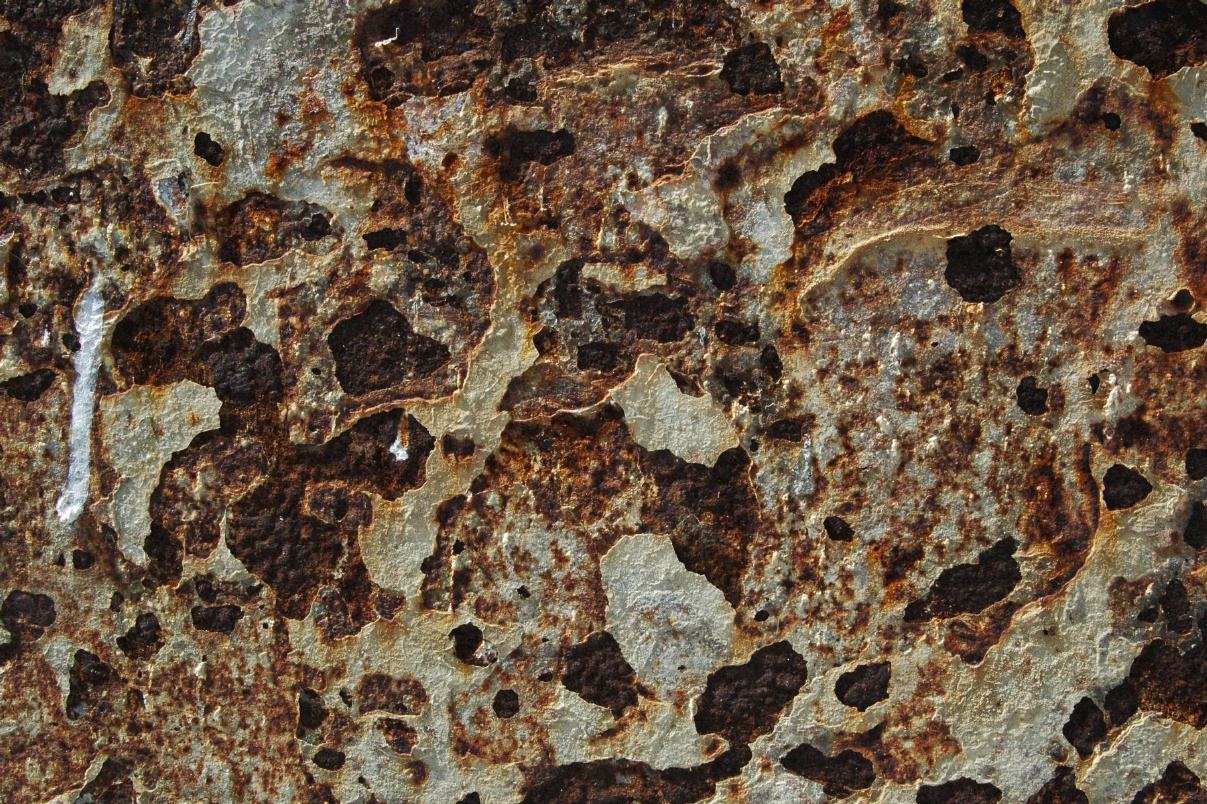 | |
|
The old robot was very old. At 10,000 years he considered
himself no longer a spring chicken. The old robot never had
a name, but a few hundred years ago he found a companion,
a smaller robot. She called him Bob. He called her Betty.
Bob examined his face in the mirror. "You know," he told Betty, "My cheeks are really beginning to rust." Betty came up behind him and bumped him with a clank. "Use more grease," she told him. "You know, the thick black stuff." Bob harrumphed. That black stuff was tar, not grease. "You just think me so ugly that I need to cover myself in tar every day." "Not so. I worry you will rust so much you will cease to function. Then I will be alone." Bob looked past the mirror. The mirror was hung on a tree. All around was dense forest. All the humans died a few years after Bob was made. Automatic factories continued to run for a while, producing junk and other robots, like Betty. Then they too ceased to function. Over ten thousand years all the trappings of civilization had crumbled and become overgrown with plants. Bob magnified the view of his face in the mirror. It was deeply pitted with rust. It looked bad. "Okay," Bob said. "Let's go find some tar." (2007) Furbo, Ireland • Photo Posted Thursday, October 4, 2007 • © 2007 Bryan Costales 
 #BP20071004.jpg Add a comment or report a mistake
|
|
|
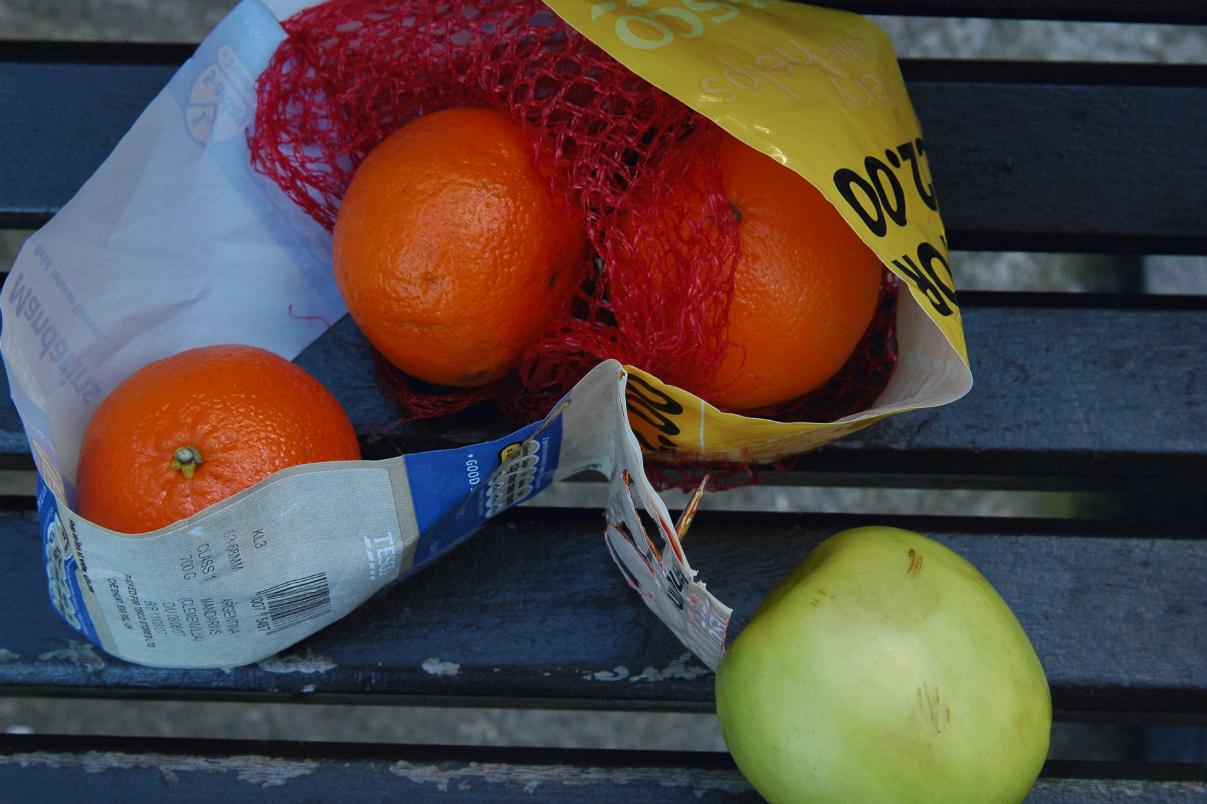 | |
|
Rick O'Mally was a loquacious old bloke. He no longer worked but still
lived at home with his aged mother. His pension was enough
to keep them living well. With a bit of extra in his pocket at month's end,
he was wont to nip a bit at the pub.
A nasty foreign fellow was sitting at the bar when Rick came in. Looking for babes he was, or so he bragged to the barkeep. Rick tried to engage him in conversation while he waited for his draft, but the fellow was down right taciturn. Now Rick had a problem some called leaky pipes. At the oddest moments he would have to dash to the loo to pee. So it was, that night. As his draft was set in front of him, he excused himself. Later, back at the bar, the sour fellow had left. Rick enjoyed his draft, then left. He remembered he had to pick up a few things at the market on the way home. The next morning Rick awoke because of his mother's yelling. What had he done now, he wondered. He got out of bed and discovered he was fully dressed. Odd. He looked out the window. The sun was higher than it was supposed to be. In the park across the street, on a bench, he spotted a bag of fruit. It looked a lot like the bag of fruit he'd purchased the night before. Slowly it dawned on Rick that something had been put in his draft. "A Mickey Finn of some sort," he muttered. Frankly ashamed of himself, Rick headed down stairs to discover what he'd done. (2007) Belfast, Northern Ireland • Photo Posted Friday, October 5, 2007 • © 2007 Bryan Costales 
 #BP20071005.jpg Add a comment or report a mistake
|
|
|
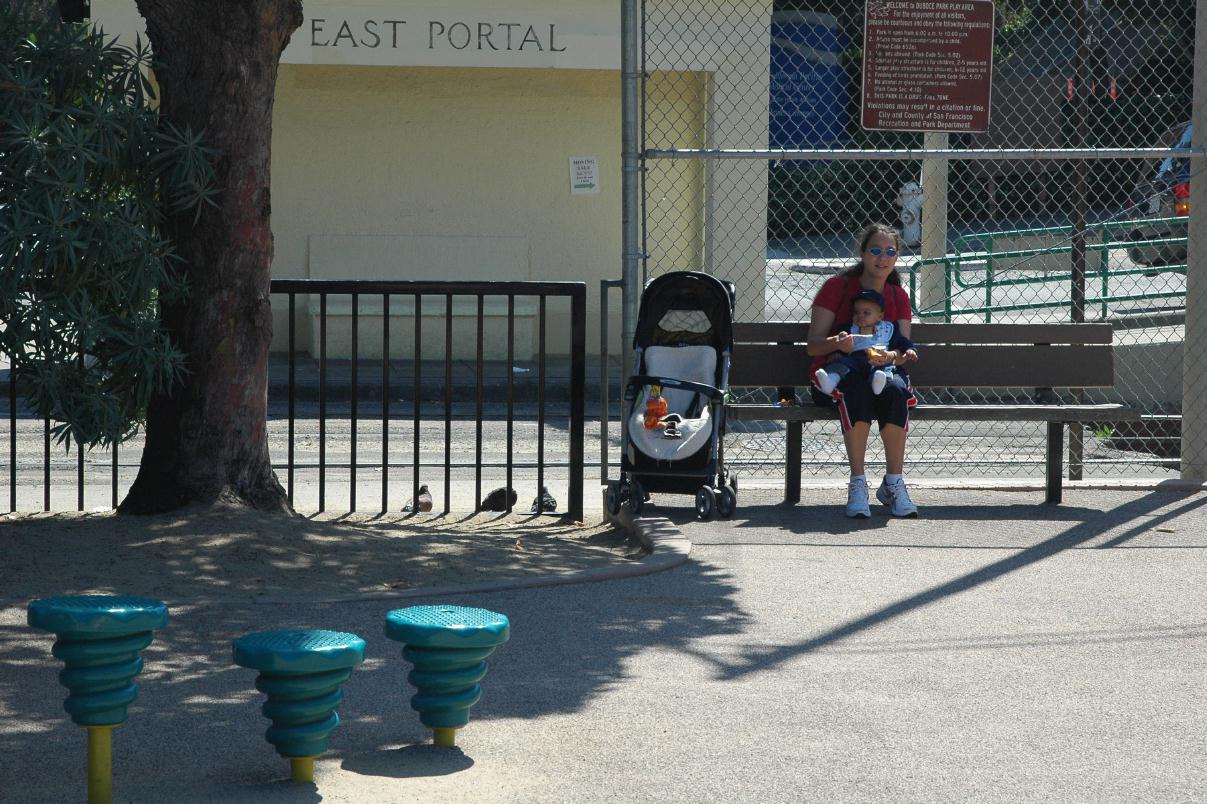 | |
|
The blue Screwheaded people arrived from another planet over
five years ago. With only one foot, they hop from
place to place, but are always frendly and fun to
have around. The never talk, and never interact with
humans.
Yenta Doodle was sunning her baby in the park that afternoon. She watched a family of Screwheads having a picnic (she assumed) in the shade. "There," she whispered to her baby, "Just think that someday you may become friends with a Screwhead." Yenta was suprised to see one of the Screwheads fall over and lay still. As far as anyone knew, the Screwheads lived forever. The other Screwheads ignored their fallen companion and eventually left the park. Yenta put her baby back in the stroller, then walked over to the fallen Screwhead and nudged it with her foot. In the blink of an eye, Yenta was gone, and the Screwhead was upright again. The Screwhead moved next to the stroller and stood there guarding the baby until the police finally came to take the baby and stroller away. As baby grew into a child and then into a man, a single Screwhead seemed always to be near. At sixteen he spray painted a big X ontop of the Screwhead. At twenty he could barely make out the X anymore, but he new it was the same Screwhead. Nobody had ever befriended a Screwhead before. The boy was written up in papers and on the Internet. He was the first. As years passed, more and more Screwheads would befriend orphans. Fifty years had to pass before anyone figured out the connection. But by then, of course, it was too late. San Francisco Walks, Walk number 38 • (2007) Duboce Triangle, San Francisco, California • Photo Posted Saturday, October 6, 2007 • © 2007 Bryan Costales 
 #BP20071006.jpg Add a comment or report a mistake
|
|
|
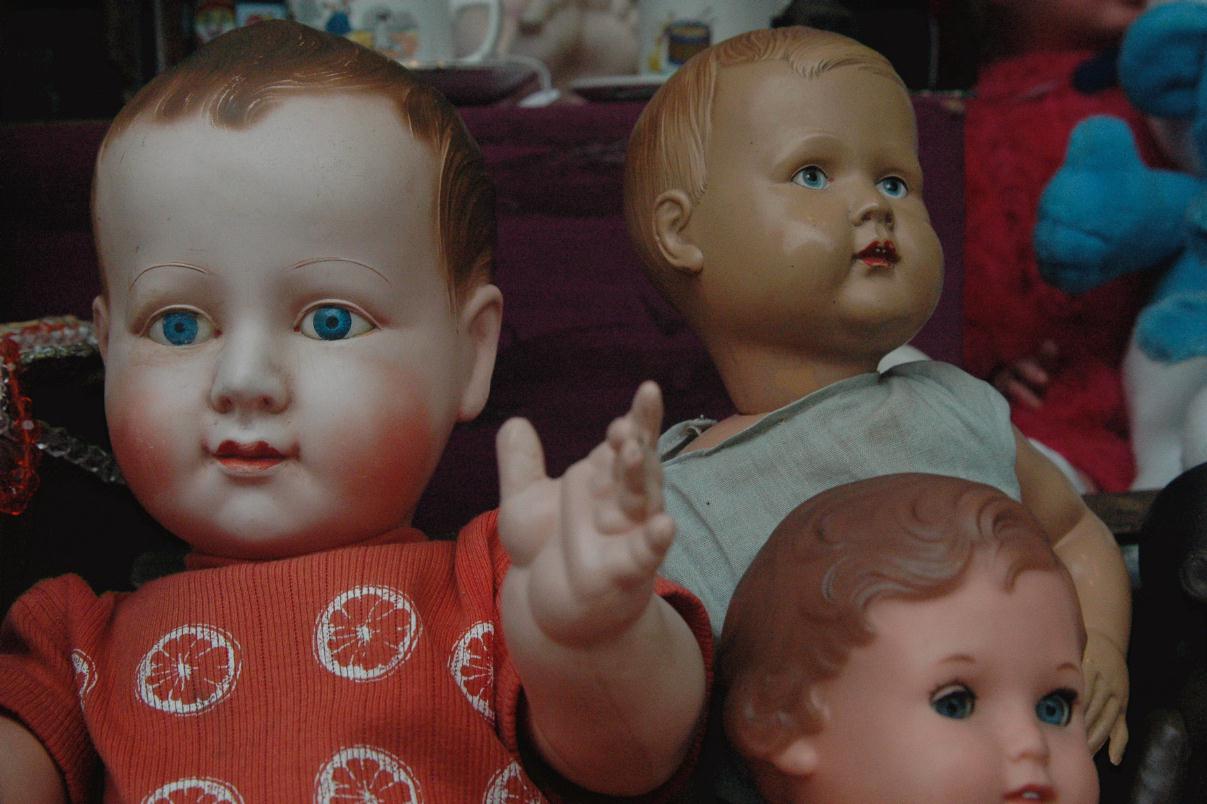 | |
|
Bitta Yongo was afraid of dolls. On day at the outdoor market
she happened upon a bin of toys. As she reached for a fuzzy bear,
a doll raised its arm toward her and said, "Adopt me."
Bitta screamed and ran. The shopkeeper called after her in French which she did not understand, "Revenu. Revenu. C'est seulement un tour," which means "Come back. Come back. It is only a trick." The next day, Bitta realized she really wanted that fuzzy bear. This time she took a towel with her to the outdoor market. At the same stall as the day before, she spread the towel and tossed it over the dolls. Safely covered, she reached for the fuzzy bear. The same doll as the day before, raised its hand so swiftly it tossed the towel aside. Exposed, it said, "Adopt me." This time Bitta stood her ground. "That is a horrible doll," she complained to the shopkeeper. The shopkeeper shrugged and said, "Une poupée ne peut pas vous blesser." Bitta shook her fist at him. "That doll is alive," she said. "And wants me to adopt it." "Cinq euros, le prennent ou le laissent," the shopkeeper said in a firm voice. Al Bitta could understand was the five euros price. She wagged a finger at the shopkeeper and said, "I wouldn't give you one euro for that freak." The shopkeeper lowered his shoulders as if defeated. "Okay," he said in English. "One euro." Then he held out his hand to collect. Bitta could have kicked herself. She handed over a one euro coin. The shopkeeper smiled the sort of smile a child smiles after having trapped a bug. Bitta gingerly wrapped the towel around the doll, careful, so as not to touch it. She carried it, as if in a sling, to the nearest trash can and tossed the doll and the towel in as one. The shopkeeper watched Bitta leave. As soon as she was out of sight, he retrieved the doll from the trash and put it back in with his other dolls. The he picked the euro coin from his vest pocket and smiled at it. "So far," he said to himself in English. "I've made twenty euros off that doll." Unseen by the shopkeeper, the doll, back in the bin, wept a single tear, and said softly, "Adopt me." (2007) Outdoor market, Brussels, Belgium • Photo Posted Sunday, October 7, 2007 • © 2007 Bryan Costales 
 #BP20071007.jpg Add a comment or report a mistake
|
|
|
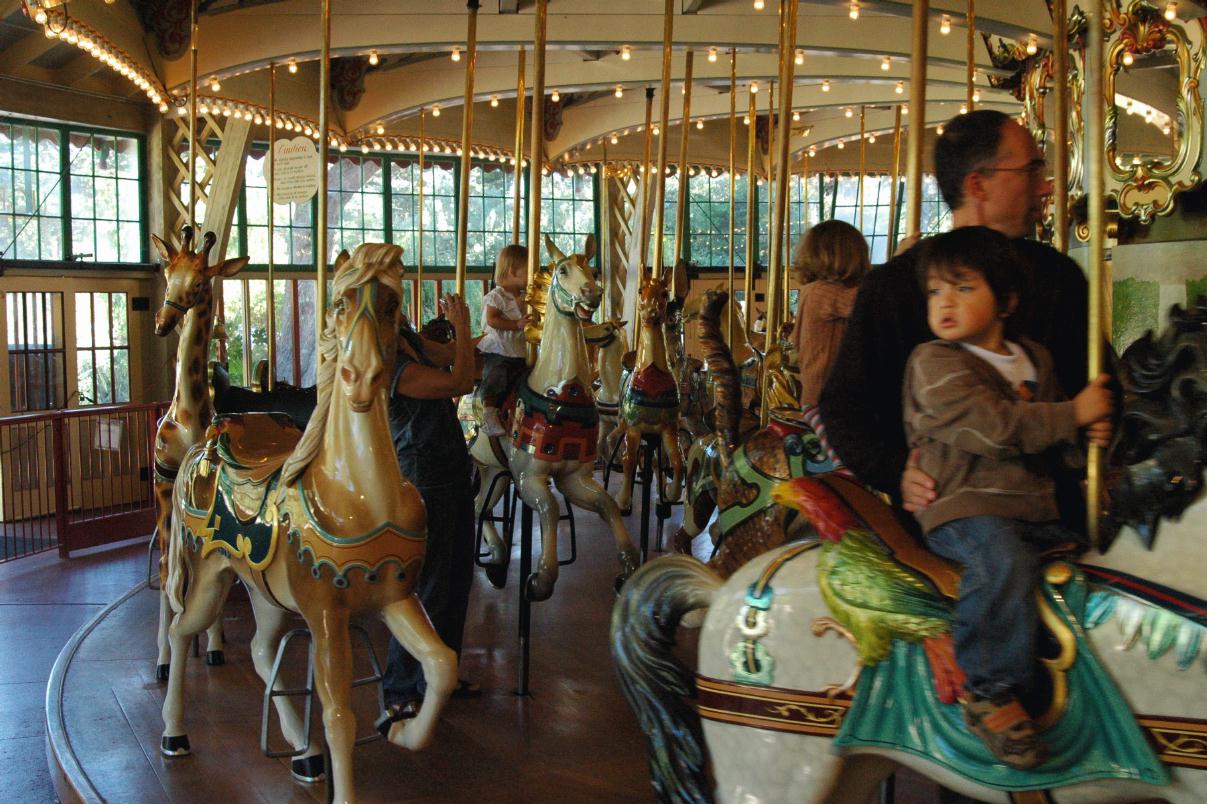 | |
|
Joshua Bean was night guard at the zoo. He liked to
eat "lunch" by the carousel because it seemed open
and peaceful there. On the night of his first
full moon there, he noticed a glow from the carousel
enclosure.
Joshua thought the glow might be from a flashlight, so he left his lunch and went to investigate. Inside the carousel building it looked to him as if the carousel was turning with children and adults riding it. Joshua held his powerful flashlight to the glass and peered through. Where the flashlight hit, the carousel was still and quiet, but elsewhere it turned with a ghostly glow. Then, just like that, the glow faded and the ghost image vanished. Joshua, deep in thought, went back to eat his lunch. The ghostly appearance had to occur twice more before Joshua figured out it only occurred at midnight under a full moon. Only when absolutely sure he could predict it, did he mention it to the other guard, Gus. The next full moon found Joshua and Gus outside the carousel at midnight. The glow appeared and the ghostly carousel began to turn. Gus, immediately pulled out his ring of keys and opened the door. "What are you doing?" asked Joshua. "I gotta see this first hand." But Gus never came out. The next month at midnight, Joshua watched the ghostly carousel very carefully. An yes, there he was, Gus riding a horse and smiling as if on a holiday. Joshua kept the ghost carousel secret and never told anyone else about it. But once per month he would watch Gus smile and wave and Joshua would wonder why Gus was so damn happy. (2007) Dentzel Carousel, San Francisco Zoo, California • Photo Posted Monday, October 8, 2007 
 #BP20071008.jpg Add a comment or report a mistake
|
|
|
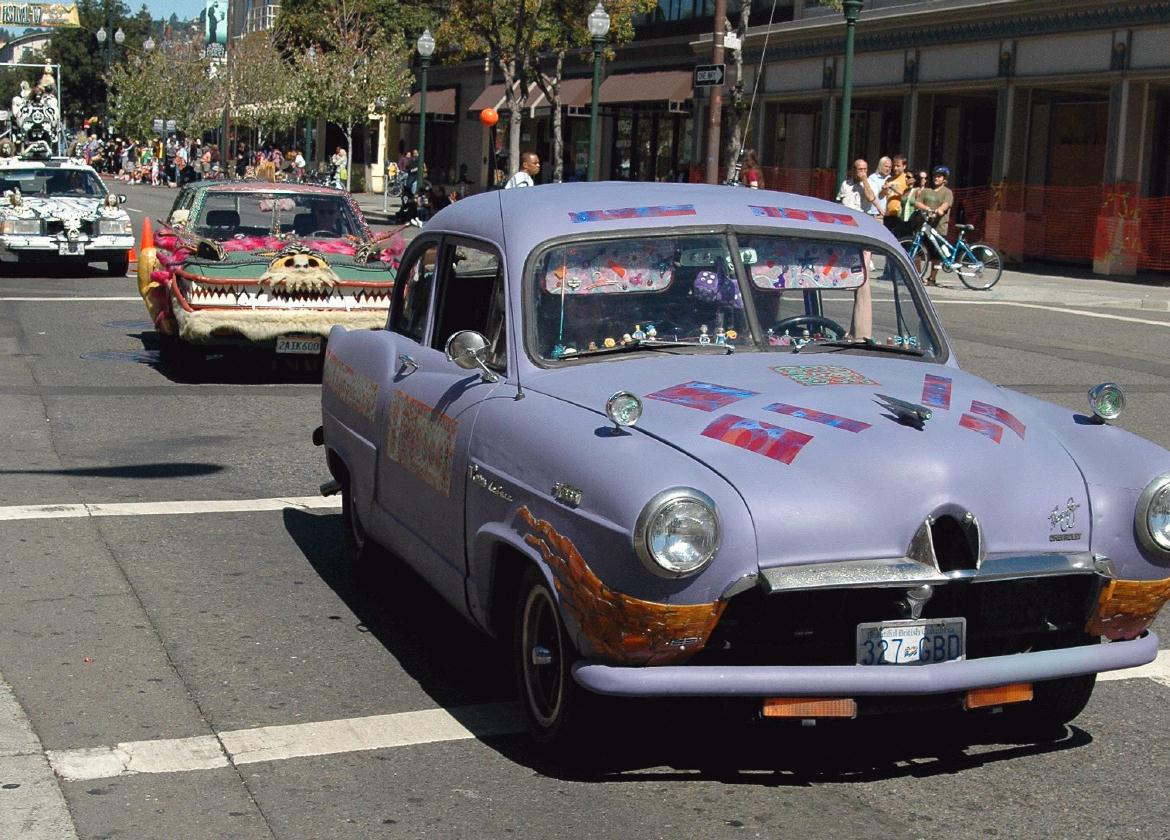 | |
|
When Edgar Waggons moved from Wyoming to Berkeley, he hauled
with him his carefully restored Model-T Ford. He parked the
Model-T in his garage in North Berkeley and there left it.
Unlike Wyoming, Berkeley was temperate all year round. In Wyoming, Edgar used the winter nights to restore his Model-T. But in Berkeley, winter night were warm, so he instead got in the habit of going for long bicycle rides. His first October, Edgar heard from a friend, "There'll be a parade of cars this Saturday." Edgar remembered the parades in Wyoming where antique, and carefully restored cars would drive by. On a sunny day, oh, how they would sparkle. Saturday found Edgar on the sidewalk of Shattuck Avenue. People in costumes passed. Jugglers passed. Protesters passed. Then came the cars. "What kind of crap is this?" Edgar asked aloud. He didn't notice the people around him frown at his comment. "These are junk cars. Why would anyone want to parade junk cars?" A kid pulled on his elbow. Edgar looked down and saw a boy in a straw hat. Edgar was surprised that his comment had been overheard. "Mister," said the boy. "Mister. These cars are not junk, they're art." Edgar wasn't sure he heard the boy right. "Art?" "Yeah, art. Look," the boy pointed. "Look at the teeth on that one." Although Edgar didn't like all art, he gradually found himself warming to the cars. By the end of the parade, Edgar had discovered he really liked the art cars. He spent the rest of the morning wandering around he art cars after they parked. He talked to the artists and chatted with others that admired the cars. That afternoon Edgar opened his garage and looked inside. The Model-T was still there. To his eyes it now looked sadly plain. "Would it be sacrilegious?" he wondered to himself. He silently felt no, and began thinking about the next year. Edgar, that afternoon, for the first time, pictured himself participating in the art car parade. (2007) How Berkeley Parade, Berkeley, California • Photo Posted Tuesday, October 9, 2007 
 #BP20071009.jpg Add a comment or report a mistake
|
|
|
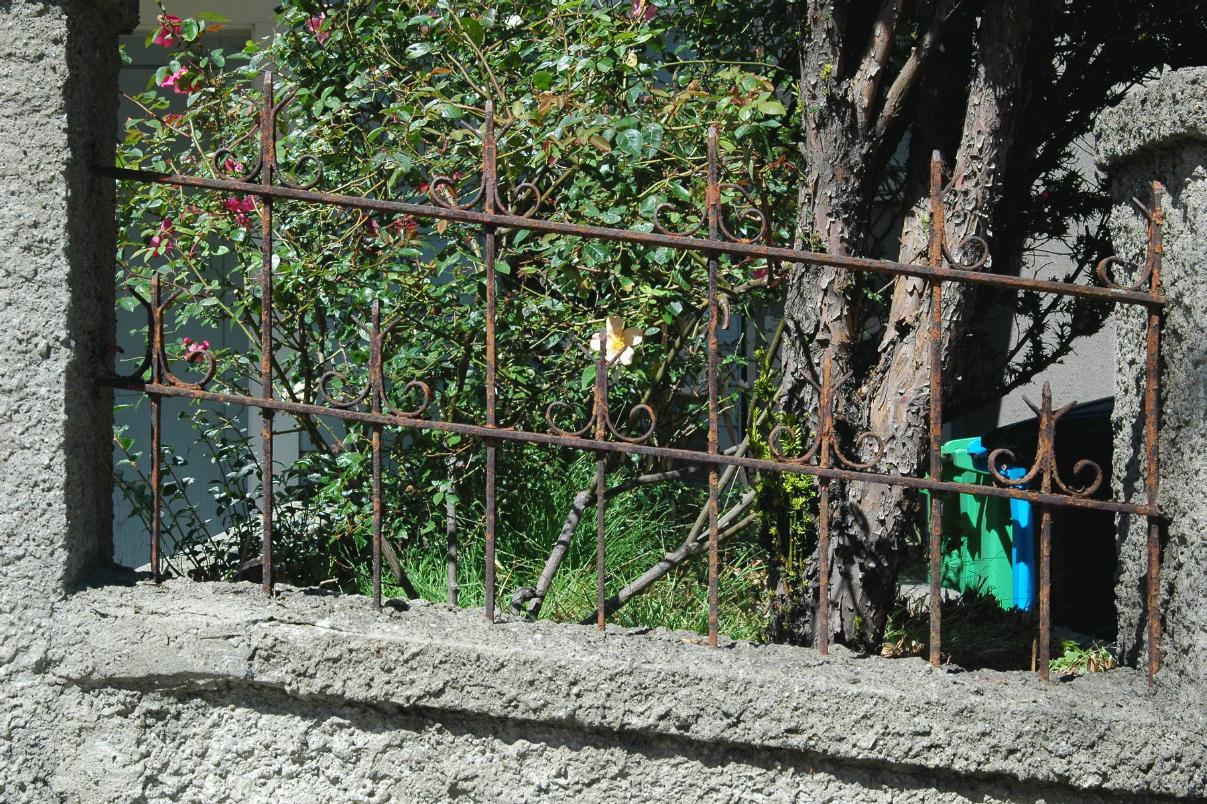 | |
|
After work every day, and still well dressed,
Jason Fields would stop at the
cafe across from the park and pick up an herbal tea to-go.
He would then cut across the park, loitering when the
weather was nice or hurrying when it was blustery or rained.
After the park it was a brief walk around the corner and
down hill to his home.
On a particularly warm Tuesday, Jason paused to sip tea next to a fence opening into his back yard. From the corner of his eye he noticed a blue object leaning against the back of his house. From where he stood, he couldn't make out what it was. It merely looked blue and vaguely plastic. Inside the house, Jason dumped his keys and the mail on the table and took off his sport coat and tie. He was about to head into the kitchen to make dinner when he remembered the blue object. It took a while for Jason to wind his way behind the house because the yard was so over grown back there. Finally he reached the corner by the fence, but there was no sign of anything blue. "Odd," Jason muttered. Wednesday, Jason paused by his fence on the way home again. The blue object was most certainly there. Jason stopped a woman walking her dog and asked, "What to you think that blue thing is?" "I can't make it out," she said. "Looks like a piece of plastic." Jason worked his way around the back of the house again but the blue thing was again missing. Thursday, Jason stopped by his fence, set his tea down, and rubbed his hands in anticipation. With great care, because the fence was rusted, Jason climbed over. As Jason placed one foot on the ground he felt the other catch on a point of the fence. The point hurt and it felt to Jason as if he had been cut. With both feet on the ground, Jason noticed the City had become very silent. He looked back over the fence but could see only fog. "Odd," he said. "It's a bright sunny day." Jason squeezed past the bush and tree to the back of the house. This, he realized, was the exact same part of the back of the house he'd been to twice before. But this time the blue thing was still there. Jason picked it up. It was wooden with a latch. Jason undid the latch and the object opened to reveal a book bound to the inside of the case. Jason read, "After work every day, and still well dressed, Jenny Strems would stop at the cafe across from the park." Jason looked up and saw a woman looking in through the fence. "Are you okay?" she asked. "There's a spot of blood on your pant leg." "Yes. I'm fine. Is your name Jenny?" "How did you know that?" "Wait there, I'll come right out." Jason closed the book and carried it past the tree and bush to the fence. The fog was still there. "Jenny," he called. There was no answer. Jason climbed backward down the fence to the sidewalk. The sunshine had returned. But the book was no longer under his arm. Jason looked and found it back beyond the fence leaning against the back of the house. Jason spun in place and felt the cut in his leg hurt. He saw no sign of Jenny. Jason picked up his tea and thought. First I'll fix the cut on my leg. Then I'll change into camping clothes. Then I'll cross the fence again. Yeah. That's it. Jason picked up his tea, whispered, "Jenny," and went into his house. (2007) Waller Street, San Francisco, California • Photo Posted Wednesday, October 10, 2007 • © 2007 Bryan Costales 
 #BP20071010.jpg Add a comment or report a mistake
|
|
|
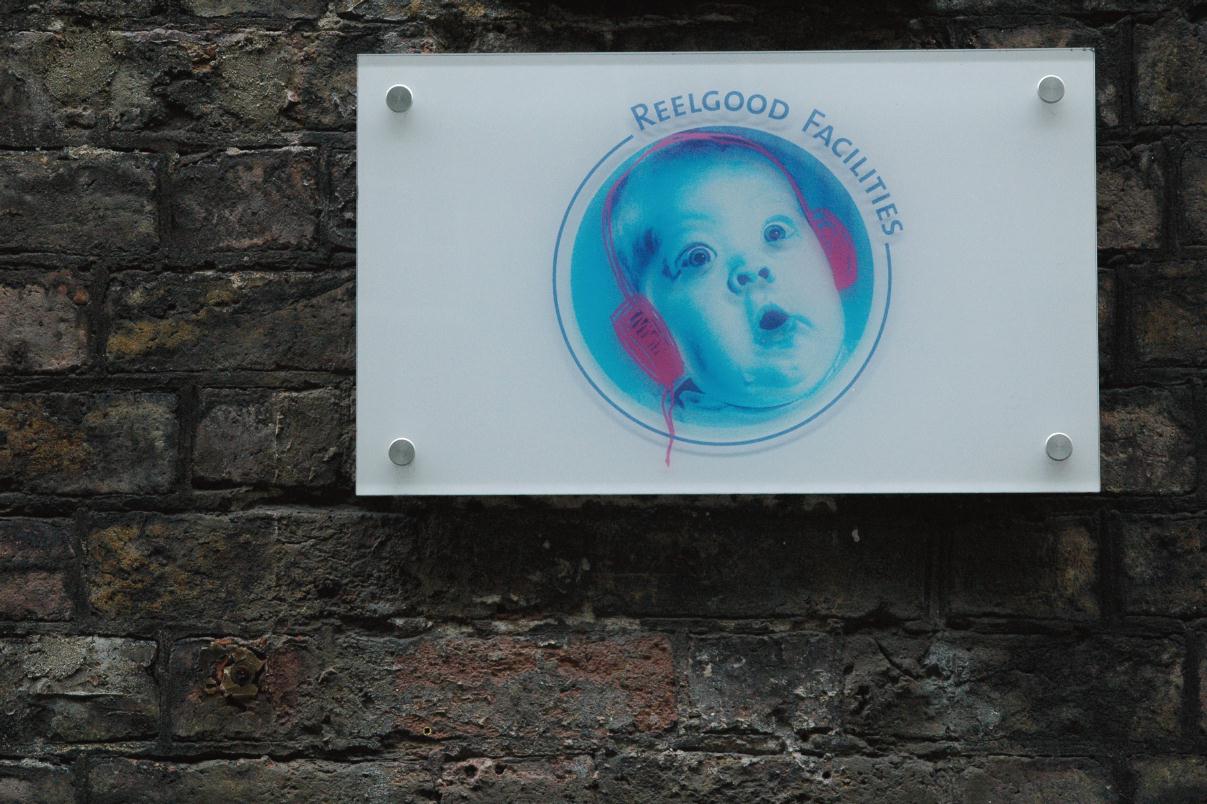 | |
|
Jenny Strems worked in reception at a recording studio
on the south end of Dublin. Traffic in town was always
so bad that she never drove. Instead she liked to stay
in shape by walking. That gave her the opportunity
to sit at the occasional bench and work on her short
story writing.
Usually she would head directly home, perhaps shopping along the way. But, upon occasion, especially when the weather was nice, Jenny would zig zag north to the parks. It was along one of her zigs that Jenny happened upon a wall bordering the sidewalk, when her shoe became untied. She set her writing case, blue plastic with a latch, on top of the wall and bent down to tie her shoe. When she stood, the blue case was gone. The wall was just too tall for Jenny to see over standing on tip toes. So she jumped and pulled herself up with her arms. Leaning over the wall she looked down but did not see her case. Instead the yard was pure grass, cut smooth, and extending to a distant line of trees. Behind Jenny she heard, "How unladylike." And, "Good workout girl." Jenny pulled herself up and over the wall and landed with a thump on the grass. There was no sign of her writing case. Jenny noticed that the City had become quiet. Looking back at the wall the other side seemed smothered in fog. Jenny backed up and backed up, but could still not see the buildings she knew were on the other side of the wall. Behind her, in the distance, Jenny heard a man swear as if he had hurt himself. Jenny became spooked. She returned to the wall and pulled herself back over it to the sidewalk. The sun was out again and the City sounds had returned. Jenny followed the wall for a ways and came to a gate. She opened it and walked inside. In front of her was a staircase with a woman sitting on it sipping coffee. "I dropped my writing case over your wall," Jenny said. "May I go look for it?" The woman smiled and nodded. She seemed lost in thought. Jenny found the inside of the wall decorated with a complex menagerie of plants. A row of low bushes bordered the wall, with just enough room between them and the wall for her to move between them. Twenty or so paces in, Jenny found her writing case. The latch had come open. Curious to see if anything had fallen out, Jenny opened the case and all looked normal. Then she noticed a corner of green paper sticking out from her pages. She pulled it out. It was a note that hadn't been there before. Jenny unfolded the note and read it aloud. "Jenny," it said. "Please come back." (2007) Dublin, Ireland • Photo Posted Thursday, October 11, 2007 
 #BP20071011.jpg Add a comment or report a mistake
|
|
|
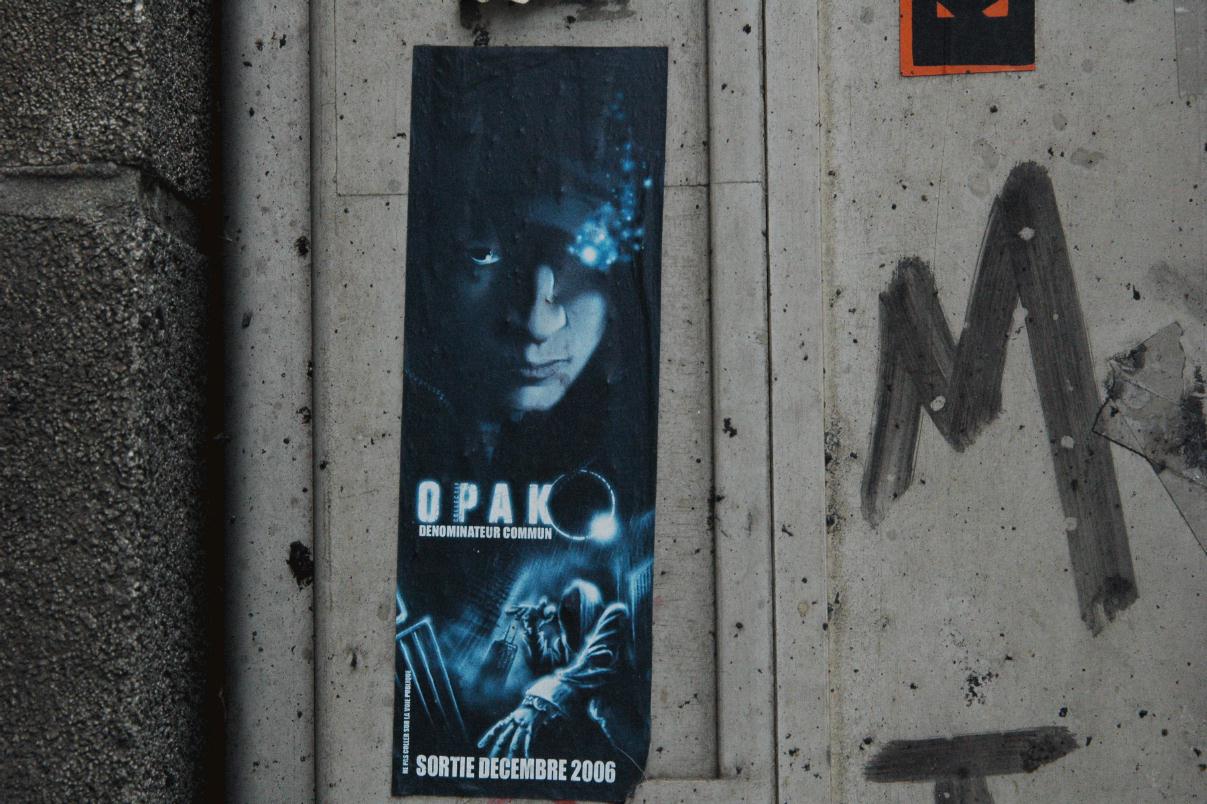 | |
|
© 2007 Bryan Costales On her way home, Rhona Finnes was startled by a crooked little sign on a wall. It appeared to advertise a new show. But the juxtaposition of the poster next to a large M just seemed plain wrong to her. Rhona studied the poster, but could find no reason for her disquiet. She shrugged and continued on her way home. Rhona walked in her front door and threw the mail on the long table just inside the doorway. The house still smelled warm and inviting from the pie she'd baked the night before. In her kitchen, Rhona heated water for tea. Her kitchen windows faced the side of the house, and through those windows she thought she heard a man swear in pain. The cry was oddly muffled and, for no reason she could discern, reminded her of the poster. Rhona approached the window and looked outside. The yard she saw was not the yard she recognized. The inside of her head felt muffled as if enfolded in fog. Instead of her carefully tended garden, Rhona saw a vast lawn bordered by trees. Rhona rubbed her eyes and looked again. But her normal yard was back. Rhona heard the whistle of her tea pot so shrugged and returned to the stove to make her tea. For some reason the yard and the poster triggered memories in her mind. Rhona remembered her mother baking dozens of pies for the fair. Rhona remembered her brother showing up from nowhere with a new bride. Rhona took her tea out the front door and sat on her steps. The memories seemed to flood her mind. She felt she was the audience in a movie. But a movie dropped to the floor, split into pieces, and reassembled in a random order. Some young woman came through her gate and asked if she could look for a writing case. Rhona's mind was so full, she could only nod and smile. The Rhona remembered a story her mother once told about how she'd met father. Something about a writing case and man behind a fence with a cut leg. Rhona stood and looked down the row of her garden that bordered the fence. The young woman was gone. The sun was shining. Rhona smelled lavender, then smiled and went inside. (2007) Brussels, Belgium 
 #BP20071012.jpg Add a comment or report a mistake
|
|
|
 | |
|
A fine, sunny Sunday found the two on a walk south of Market.
The visitor had just seen the military cemetery at the Presidio
the day before, so was confused when they passed the freeway.
"You Yanks are so bizarre. You put a cemetery right next to a busy road." His San Francisco friend didn't understand. "You mean these uprights for a future freeway?" "Yes. Like the cemetery we saw yesterday. All the headstones are the same and all in a line." His friend led the visitor across the street. "Here," said the friend. "You see they have no names on them." "Yes, but I think these are future headstones for some future war you Yanks will wage." A Japanese tourist couple approached and paused to see what the two were looking at. "Perhaps," continued the visitor. "One day soon, a big bomb will go off and so many will die they must use these monuments to etch all the names." His friend tried to see the uprights in the same way the visitor did, but to him they just looked like the start of a freeway. One of the Japanese took out a camera and clicked a shot of the uprights. The visitor said to the Japanese couple in broken Japanese, "Grave stones, you like?" Both the Japanese laughed. They walked off talking together and laughing. His friend asked the visitor what he had said. "I told them 'grave stones'." His friend laughed. "No, not grave stones. Somber perhaps." "You Yanks!" the visitor laughed, and punched his friend in the arm. The two continued their walk toward downtown and toward more pleasant misunderstandings. A fine, sunny Sunday indeed. (2007) Central Freeway, San Francisco • Photo Posted Saturday, October 13, 2007 
 #BP20071013.jpg Add a comment or report a mistake
|
|
|
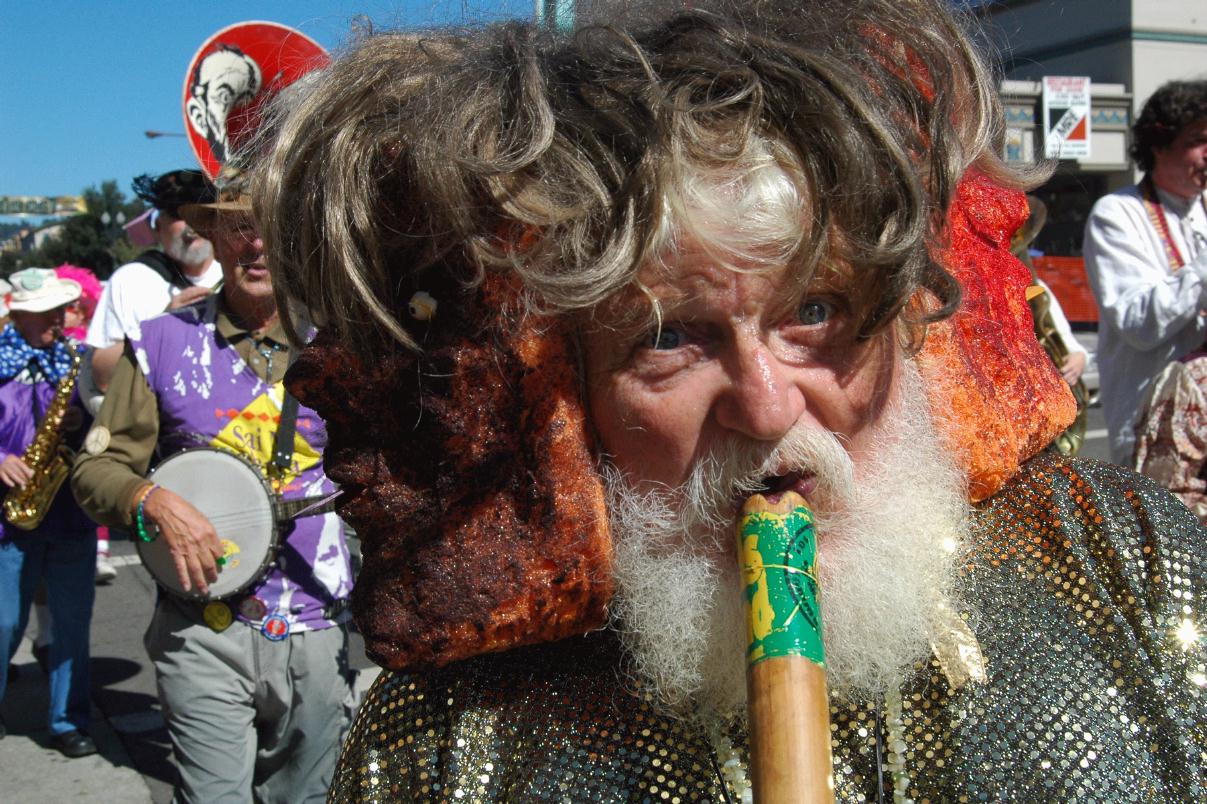 | |
|
Balthar VI was sent back in time to fix a small problem. He landed
in the middle of a parade. Not the most quiet of entries, but one that
might, he felt, fit his needs.
Balthar turned on his cloak of invisibility, and lollygagged until he fell back into a group of musicians. There he dropped his invisibility and fit right in, playing his flute and walking with them. Somewhere along the route, he was supposed to spot a small brown dog tied to a fire plug with a red length of rope. His boss had been very vague about the color of the fire plug and about exactly where on the route the dog might be found. Balthar rounded a corner, and there on the other side of the street he spotted the dog. It looked like a mutt, and seemed old and asleep on the sidewalk. Whomever's dog it was, seemed nowhere near. Balthar switched back on his cloak of invisibility and angled across the road to the dog. "How you doing there boy?" Balthar asked and rubbed the dog behind his ears. "Do you mind if I look under your collar?" The dog opened on eye and looked at Balthar, then closed it and seemed to snooze again. Balthar felt under the collar and there found what he had most feared. A tiny lump that was a micro-A-bomb from the next century. With great care, Balthar removed the collar and replaced it with an identical one he had in a pocket. Balthar then stood and moved back against the wall of a cafe, to wait and perhaps to see who might have put the dog there. Balthar slowly drifted backward in time, watching the dog. While he waited, Balthar dropped the collar in a time-box and sent it forward in time to experts that knew how to disarm a micro-A-bomb. About an hour before dawn, Balthar discovered the man who had tied up the dog. It was himself, or more exactly, a much younger version of himself. Balthar didn't remember leaving the bomb, so he couldn't figure out how he could be watching himself. Balthar knew he couldn't confront himself, or the very fabric of time itself might unweave. Then, despite Balthar's invisibility, his younger self looked directly at him and winked, flickered, and vanished. The dog closed its eye. The dog, it seems had been projecting the image of the young Balthar. Then the dog vanished, Balthar assumed, forward in time. Balthar stood by the cafe, stunned and puzzled. Then he fingered a button on his gown and was zipped back into the future. Balthar was certain his report would prove interesting to his boss. The Los Trancos Woods Marching Band • How Berkeley Parade and Art Car Fest • Photo Posted Sunday, October 14, 2007 
 #BP20071014.jpg Add a comment or report a mistake
|
|
|
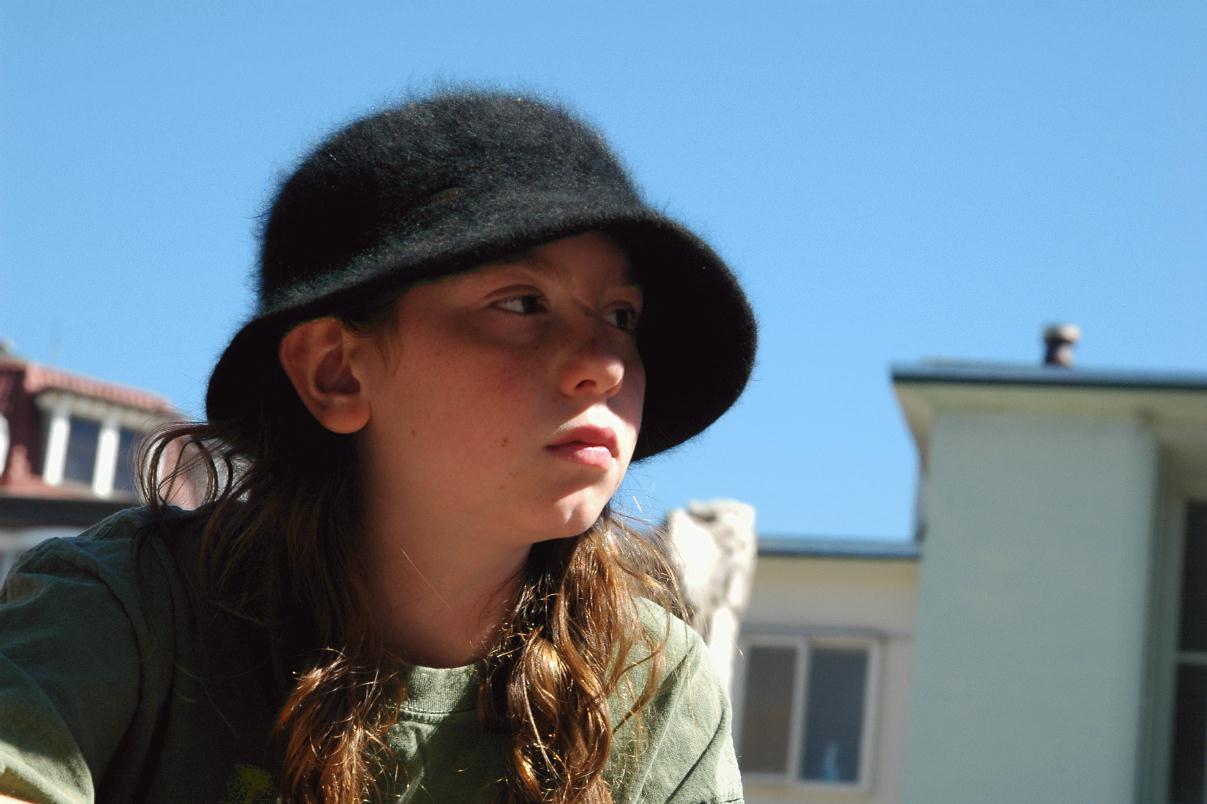 | |
|
Sadie Sidewell was a young girl but had a cracker-jack mind
for numbers and mysteries. Last Saturday morning, for example,
she counted the top-story windows in the building on the
U.C. Berkeley campus. Some, like the
tower, had only one very high up, while others, like the student store,
had dozens.
Sadie applied numerology to the counts. That is, where A is one, and B is two, and so on up to Z is 26. The window counts, when converted to letters, spelled her name, Sadie Sidewell. Her parents thought she was being silly. Her friends thought she was being egocentric. None, however, ever discouraged her. On Tuesday morning, on her way to school, Sadie noticed numbers sprayed on the sidewalks in yellow and blue paint. Using her head she figured out the code as she walked. She was almost to school when it hit her. The numbers were a name and a location. Bobby Theo was the name and the location was a latitude and longitude. After home room, Sadie asked for a library slip and used one of the library computers to do research. She quickly found that a young boy named Bobby Theo had been kidnapped in Texas, and the latitude and longitude were in Oklahoma (just above Texas). Sadie wasn't sure if she should tell anyone. She wanted to recheck the numbers after school. But, just in case, Sadie found the email address of the Texas sheriff and emailed him with her discovery. On her way home, Sadie noticed the numbers were gone. She knelt down and felt the sidewalk and it felt damp. Someone had washed off the numbers. That evening, over dinner, Sadie confessed to her parents that she emailed the sheriff in Texas. "You did what?" he Mom asked. "And on the way home, the numbers were gone." "You did what?" her Dad asked. The telephone rang and her Dad answered it. "It's your Grandma. She says to watch CNN right away." Sadie ran into the living room and clicked the remote. The news came up and announced that "The missing Texas boy, Bobby Theo, was found this morning in a storage locker in Oklahoma. Apparently a tip was received by email from a woman in Berkeley. The boy is alive and well...."
"Was that you?" her Mom asked. The doorbell rang, just then, and a moment later, Sadie's life changed forever. How Berkeley Parade and Art Car Fest • Photo Posted Monday, October 15, 2007 
 #BP20071015.jpg Add a comment or report a mistake
|
|
|
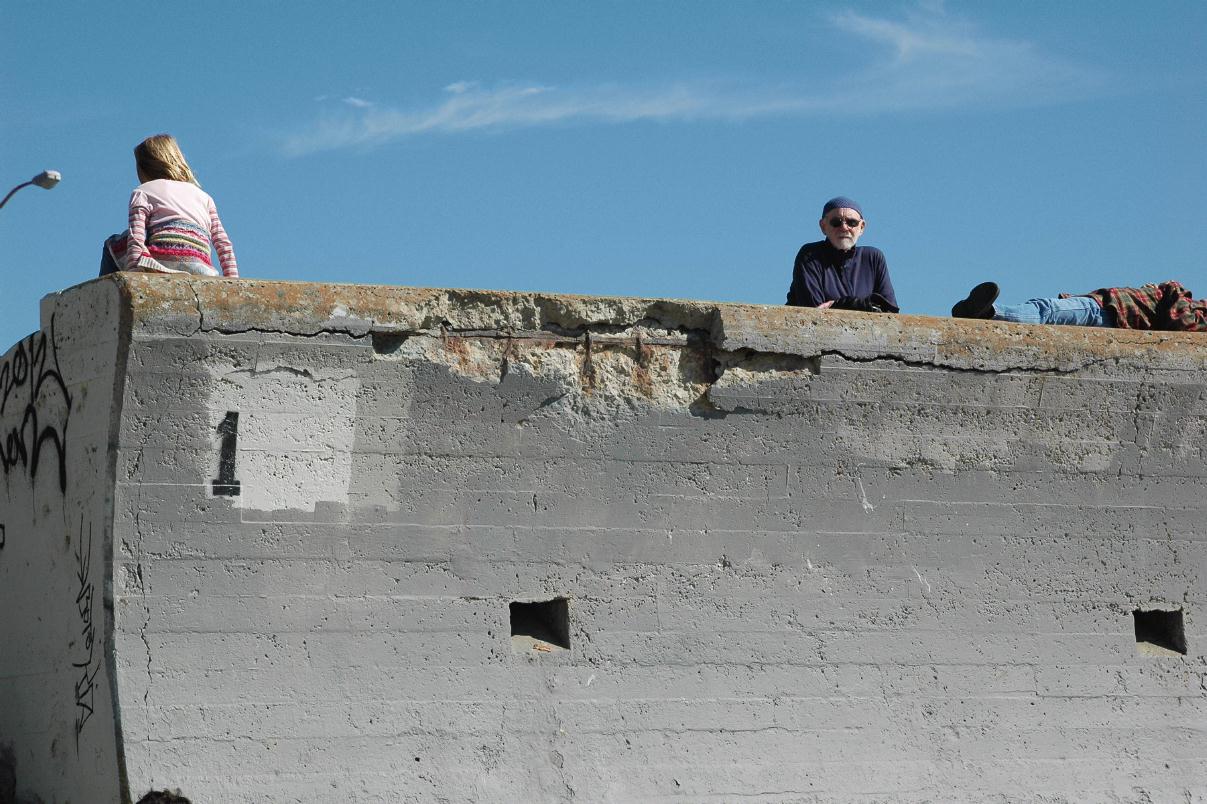 | |
|
Mary Mich-Yang enjoyed the rare warmth of the afternoon.
The seawall overlooked the Pacific Ocean, a vast body of
water that extended from the sea wall to the horizon.
She leaned over and looked at the water licking the concrete
a mere few feet below where she stood.
"You know," said the man leaning against the sea wall a little ways off. "This used to be a wide beach." Mary looked at the man. He appeared old, very old. Perhaps 150 or more. The man stood straight and dusted himself off. "Why, when I was a kid, maybe fifteen or so, I would make sand castles on this very beach." Mary looked over the old man. He looked so old he was probably among the millions of First Borns that were now distorting world demographics. "It's too deep," Mary said. "Balder-snatch," the old man gestured toward the water. "At low tide you can walk out there and keep your head above the water. You won't want to, of course, because of all the junk storms have washed in over the years." Mary thought the old man looked good. Healthy that is. It seemed to her that he might live for another sixty years or so. The old man walked over to Mary. "There," he pointed inland across the road. "Now all you see are tall glass towers that reflect the sunset back to sea. But when I was a boy, my dad told me about a fair that used to be there. It was called Playland at the Beach and had Laughing Sal." "What's a Laughing Sal?" "Oh, that's right. The Musé Mechanic burned down along with most of Fisherman's Wharf during the quake of ought-57." Mary looked where the man pointed but only saw a Megaplex and a Starbucks across from the subway station. "Never mind," the old man said. He turned and walked away. He didn't look back. Mary watched him go and wondered why old people always seemed to dwell on the past. She shrugged and looked back out to sea. (2007) Ocean Beach, San Francisco, California • Photo Posted Tuesday, October 16, 2007 • © 2007 Bryan Costales 
 #BP20071016.jpg Add a comment or report a mistake
|
|
|
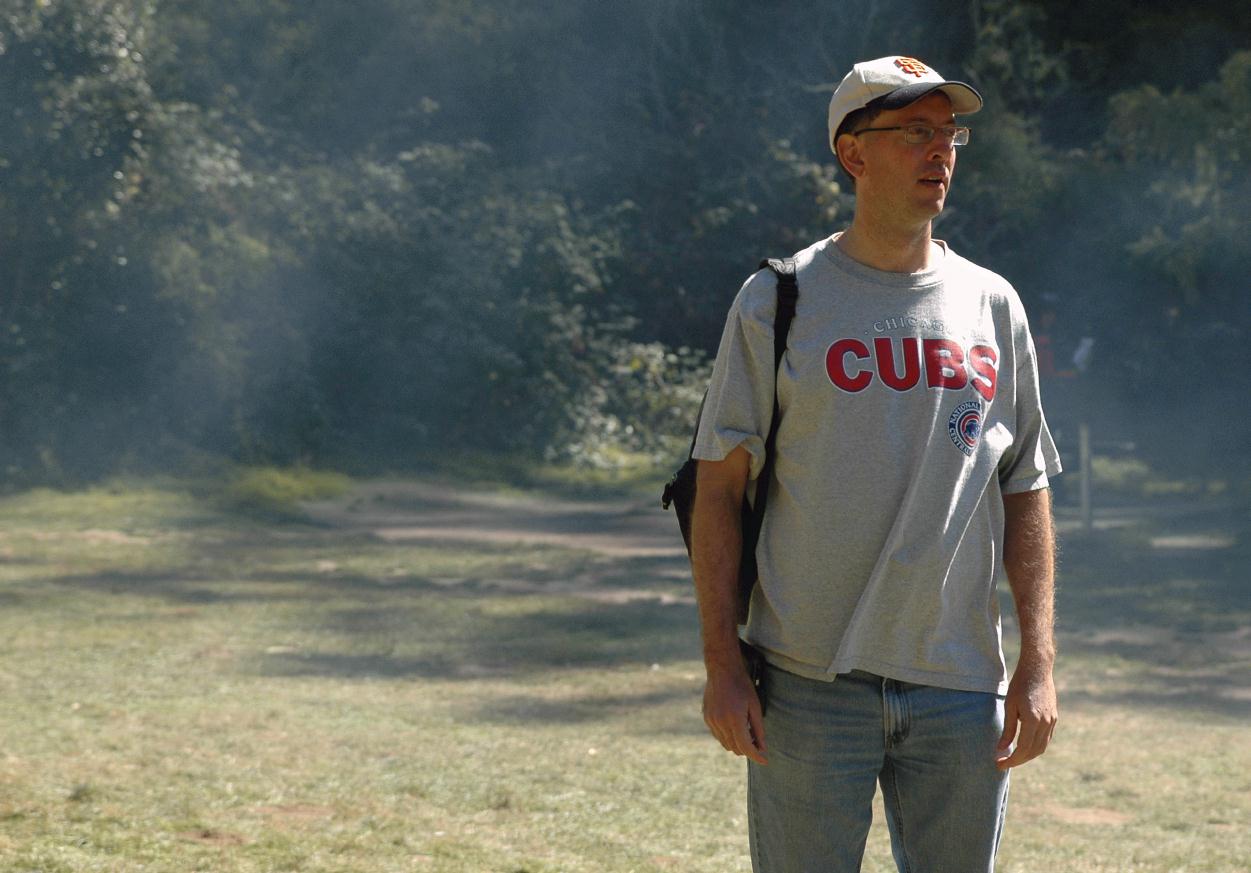 | |
|
When Mitch Doogle died, his wife got it into her head to
ship his clothes to their son. She boxed them in brown
boxes and shipped them UPS. She checked the web site like
Mitch had taught her and was relieved when the web site
said the boxes had been delivered. She waited, and months
passed before she heard back from her son.
John Doogle had no idea what to do with three boxes of his father's clothes. The current and new stuff was all too large. But at the bottom of one box was a selection of old clothes and they fit. John wore his dad's old White Sox shirt and hat. He hadn't been able to attend the funeral because he was in the hospital with a kidney stone at the time and was doped up on morphine. John cut through the park and bought himself garlic fries at a festival that was going on. His dad had always sought out garlic fries when he visited, and it seemed to John the right thing to do. On Irving, John found a florist. He bought a bouquet of flowers, a bright happy mix of several kinds of blooms. John ended his day at home packing the oversized clothes in plastic bags to later take them to Goodwill. The few clothes that fit were folded and set on the small kitchen table. John placed a vase of the flowers in the center. The display seemed to be missing something. John dug through his drawers and found an old column candle. He set it on a plate and set it among the clothes. He lit the candle and looked at the result. The candle smelled of pine. John felt himself crying. He had waited until then to miss his father. For day's after, John wore his White Sox outfit everywhere. Then he began to miss his father less. He recycled the too large clothes at Goodwill. Then he stopped wearing the old White Sox clothes. Only, then, months later, was he finally ready and comfortable. At home that night, John dialed the phone. "Hi mom," John said. Hardly Strictly Blue Grass Festival • (2007) Speedway Meadows, San Francisco, California • Photo Posted Wednesday, October 17, 2007 
 #BP20071017.jpg Add a comment or report a mistake
|
|
|
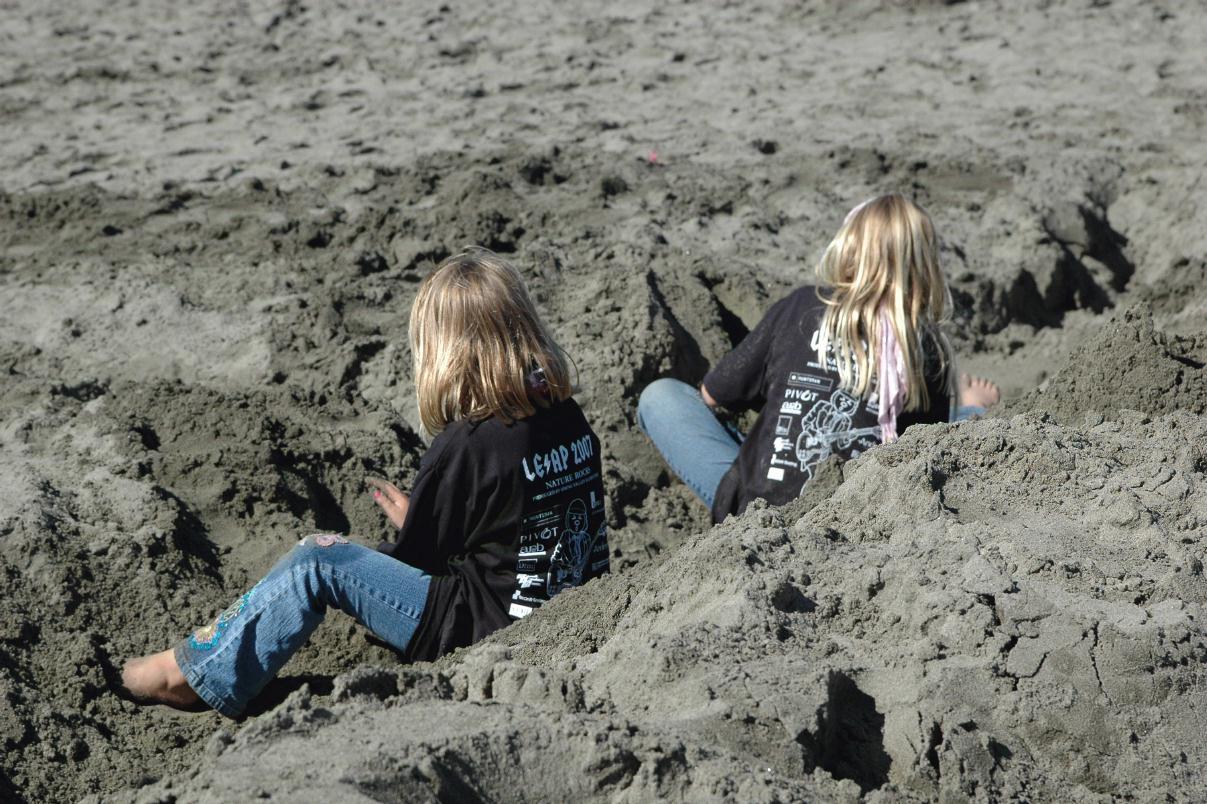 | |
|
Sally and Sandy were twins. Sally liked to sail and see
movies, and so did Sandy. Sandy liked the beach and
the zoo, and so did Sally.
One morning while digging in the sand at Ocean Beach, a rogue wave swept in and washed both girls out to sea. Because they were twins, they washed out together. Sally was found by a freighter and revived with CPR. She was locked in a room, she was told, "For her own good." After more than a week she found herself in a land full of trees, a place too humid. She was auctioned off to a rich family as a slave. The family spoke a language Sally did not recognize. She spent the next twenty years among strange smells doing laundry and cooking meals. Sandy was rescued by a surfer and revived in the ambulance on the way to the hospital. Later she stood with her parents at the funeral for Sally, twin sister lost at sea. On her twenty-eighth birthday, Sandy was on a tour through south-east Asia. On the streets of Saigon she was startled when a man put his face just inches from hers and yelled, "What are you doing out of the house." His breath smelled like fish. "You must never leave the house." The man's eyes went wide as he realized his blunder. He ducked and moved quickly to lose himself in the crowd. The Saigon police were little help. That is until Sandy spotted a hand drawn poster on the wall. It was a picture of the man that had yelled at her. With this information the police became very interested. Sally punched Sandy in the arm. "How come ever time you tell a story, you end up rescuing me?" Sandy rubbed her arm. "Well how come every time you tell a story I end up killed?" Leap for Kids, Sand Castle Contest • (2007) Ocean Beach, San Francisco, California • Photo Posted Thursday, October 18, 2007 
 #BP20071018.jpg Add a comment or report a mistake
|
|
|
 | |
|
The ghost appeared looking much like a white shadow under the tree.
Greg Tuffly eyeballed the ghost, reached out to touch it, and said,
"What the heck are you?"
The ghost pointed with a pale hand at the berries in the tree. Its voice seemed like wind whistling through the cracks of a broken window. "The berry," it said. "Beware the berry." Greg picked a berry and looked at it. It was tiny, round and black. The ghost vanished. Greg smelled the berry and it smelled like nothing at all. Greg tossed the berry in the gutter. That evening the front doorbell rang. "Go get it," said Greg's wife Betsy. "It might be the books I ordered from Amazon." Greg looked through the peephole and saw two tall men dressed all in black, like waiters. They bobbed and weaved oddly. One called out, "Betsy. Open the door Betsy." "There's men out there," Greg said to his wife. "They move like birds. You know, like those ugly African birds we saw at the zoo." His wife stepped up beside Greg and said, "Let me look." She peered through the peephole. "There's nothing there." The next morning Greg was walking to work and passed the same tree he had the day before on the way home. It was Friday so he dressed casually, in blue jeans and a sweatshirt. He paused and picked a berry. He smelled it again and again it had no odor. He licked it and it seemed benign. Greg frowned and delicately bit into the berry. The taste was so bitter he had to spit it out. All around Greg appeared tall men dressed in black. They moved like birds. "Betsy," they called. "Come out, come out." Greg ran. He ran as fast as he could to his office building. Inside the door he caught his breath and looked back outside. There was no sign of the black suited men. Greg got on the elevator and pushed the 22nd floor. The elevator became silent and the ghost appeared. "Greg," it hissed. "You were foolish." The inside of the elevator became normal. Greg calmed as he rode it to his work floor. "Good morning, Greg," the receptionist said to him. "Nice suit. Black becomes you." (2007) Noe Street, San Francisco, California • Photo Posted Friday, October 19, 2007 
 #BP20071019.jpg Add a comment or report a mistake
|
|
|
 | |
|
© 2007 Bryan Costales Henry Stacklov bought a six pack of beer and headed down the dock to his boat. He set the six pack on the deck and was about to step aboard when he spotted a wing floating in the water. Henry lifted his sun glasses to see better, but the wing was floating just below the surface so he could not make it out clearly. It was, however, a huge wing, much bigger than any bird he's ever seen on the delta. Henry grabbed a boat hook off his boat and telescoped it out as long as it would go. The boat hook barely reached the wing. With some grunting, Henry managed to pull the wing closer and closer. Henry wiped the sweat off the back of his neck and thought about opening one of those beers. But the current was pulling the wing away again, so he abandoned that thought and resumed nudging it closer. Finally the wing was close enough for Henry to hook it, and he tried to pull it onto the dock. But the bird, or whatever was connected to the wing, was too heavy. Henry gave the wing a hard heft and was surprised to see a human body attached. The body was dressed in a black suit, the sort a waiter might wear. Two wings sprouted from the upper back of the suited man. A chunk of flotation foam seemed to be stuck under the man, keeping him floating just below the surface. Henry's last tug was just strong enough to roll the man off the flotation foam. Exhausted, Henry watched the man, and then the wing sink from sight in the murky water. Henry pondered what to do. Tell someone or come back later with a grappling hook and try to pull it up himself. Henry couldn't make up his mind. So he pulled the cell phone from his pocket and called his wife. While it rang, Henry thought of how thirsty he was and how near the six pack was. When his wife answered, Henry had almost forgotten about the wing. "What is it, honey," his wife said. "Did you forget something at home?" "I found an angel floating in the water. Wings and all." "That's nice dear. But you know better than to call me when you're drunk. Sober up first." His wife hung up. Henry tossed the cell phone onto the deck. He stepped aboard and sat down. Henry was so thirsty he drank the entire six pack. Only then did he cast off and motor out for a day of fishing. (2007) Sacramento Delta, California • Photo Posted Saturday, October 20, 2007 • © 2007 Terry Costales 
 #BP20071020.jpg Add a comment or report a mistake
|
|
|
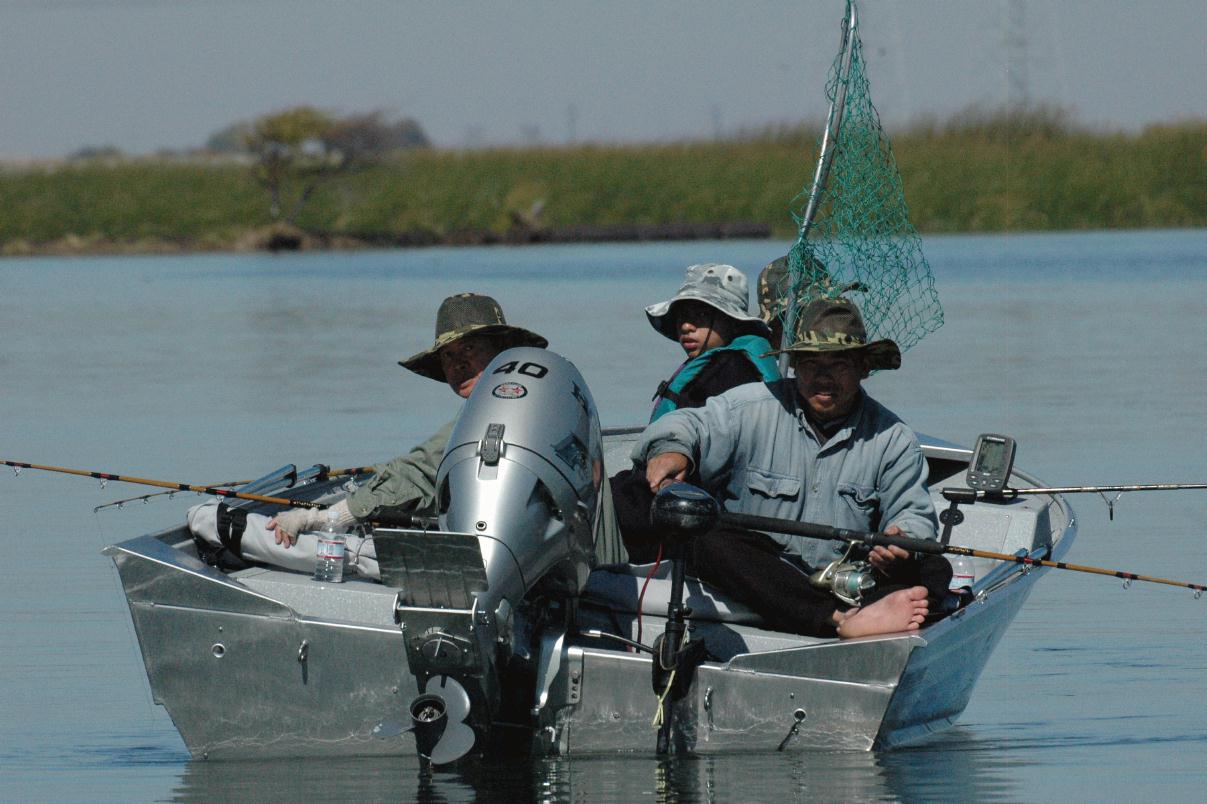 | |
|
© 2007 Bryan Costales The Sanchez brothers loved to fish on Sunday afternoons. Generally the Delta weather was mild and the fishing good. Juan Sanchez was the oldest and knew the waters best. "The turn below the old bridge," he had decided that morning. "And we will eat well tonight." Paul Sanchez lazily let his line drift in the water. No fish had started to bite yet and he found himself feeling a bit sleepy. Then his line twitched and Paul was suddenly alert. Ceasar, the youngest, sat on his own side of the boat and ignored his brothers. Paul waited, felt another firm tug. He flicked his pole to set the hook and braced to play the fish. But instead of a gentle splash and tug, Paul felt his line run out at a furious rate. "Break the line," said Juan. Paul tried to break the line but, to his suprise, the pole was yanked painfully from his hand a disappeared into the otherwise still water. "What was that?" asked Juan. "Are the fish getting to strong for you?" Ceasar laughed. Then somthing under the water hit the boat hard. Juan almost fell in. "What the hell," he yelled. The the boat was visiously flipped over and threw the three brothers into the water. Terrified, they dog paddled and swam to shore. The water near the shore was shallow enough for them to stand so they stopped and turned to look at the boat. Their boat, their prized boat, was upright in the water, with the motor at the top. In jerks it was being pulled into the water. It looked to them almost as if the boat was being eaten. "Good lord," said the usually quiet Ceasar. "Something's eating the boat." "My pole," yelled Paul. "The damn thing ate my pole. I paid good money for that pole." "Look," Juan said and pointed. A huge tail, forked at the end, rose from the water and splashed back down. At last the boat disappeared and the water was quiet. "What will we tell pop?" Ceasar asked. "We tell the truth," Juan said. "You mean we lie," Paul countered The three Sanchez brothers stood in the water near the shore. They dripped water. They pondered silently. At last, Juan announced, "I think its time we took up golf." His two brothers nodded in agreement and never fished again. (2007) Sacramento, San Joaquin Delta, California • Photo Posted Sunday, October 21, 2007 • © 2007 Terry Costales 
 #BP20071021.jpg Add a comment or report a mistake
|
|
|
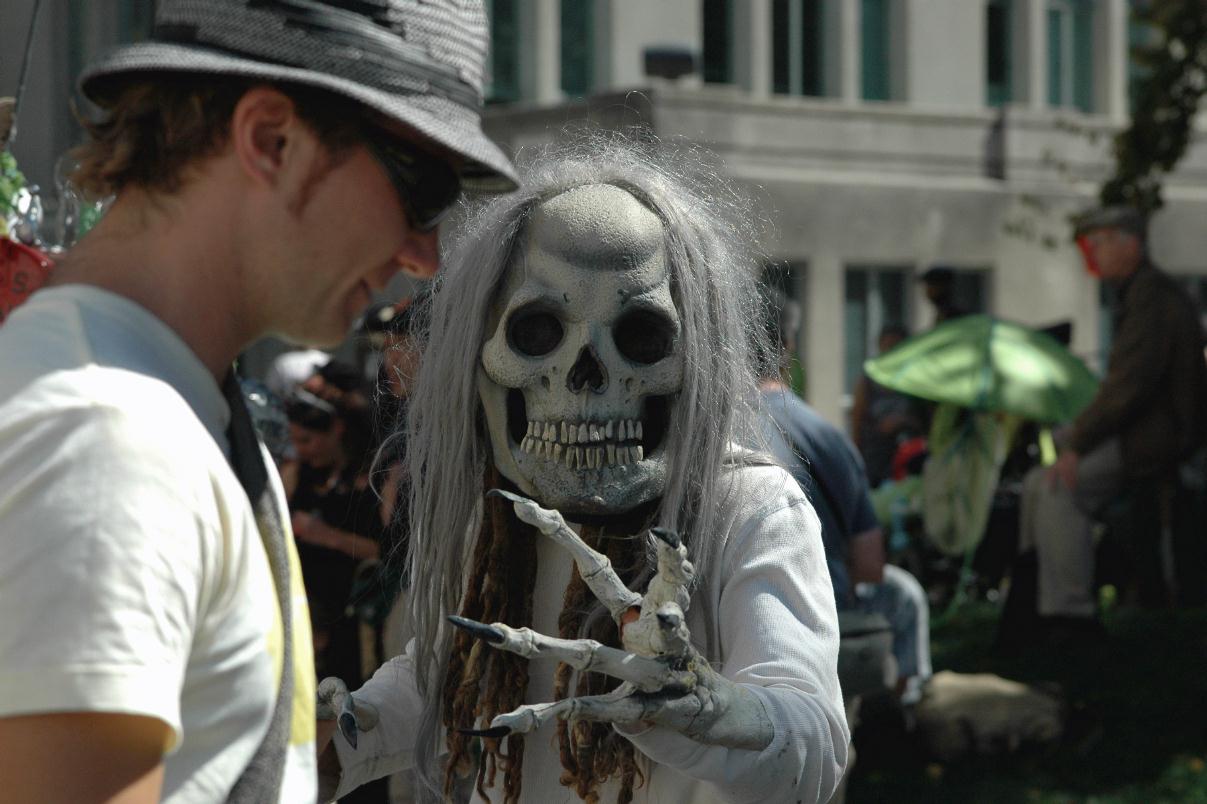 | |
|
Death was always careful to avoid touching anyone who should
not die just yet. In crowds, he would wend his way like a wisp
of smoke between moving people, never touching, until he arrived
safely next to the one whose life he was supposed to take.
Death was in a bit of a rush that morning. He succeeded in avoiding wrongful touches to people, but accidently grazed the lens of a camera, and a tiny piece of himself stuck to the lens. As Death felt the piece tug free, he also felt the universe tilt wrongly akimbo. Murray Obilisky took a shot of a woman wearing a colorful hat. As he pressed the shutter, a man walked in front of him, spoiling the shot. Murray frowned and held his shot until the man passed then shot again. Unfortunately the smile on the woman changed in that moment to a look of surprise, also spoiling the shot. Murray lowered his camera and discovered a crowd forming around a man fallen to his right. It was the man who spoiled his shot. The man had blue lips and was holding his left arm. The man looked about to die. That evening, Murray uploaded his photos of the day and looked at them on the computer. The shot spoiled by the man walking in front was not what Murray expected. Just beyond the man was a skeletal creature who appeared to reach out to touch the man. The face of the creature sent a cold shiver up Murray's back. He suspected it was the face of Death. Murray scratched his thinning hair. "I wonder," he said. Murray carried the camera into the bathroom, turned on the light, and took a self portrait of himself in the mirror. On the back of the camera he reviewed the shot and there, standing a short ways behind him but not reaching out, was Death. Death was just watching him. Murray had nightmares all night and over slept the next day. Once awake, and with some coffee to help, Murray decided to trade in his camera. "We can't get anything for that camera body, so I can't give you anything for it," the salesman in the camera store told him. "But you should keep the lens. That's a good lens." Armed with a fresh camera body, Murray went out shooting. But again, as he reviewed each shot, every one had Death in it somewhere, watching him. Seriously nervous, Murray decided to trade in the lens too. He glanced across the street and saw another camera store. He looked right to make sure no cars were coming up the one-way street then dashed. Murray heard the truck horn and barely had time to realize the truck was running the wrong way on a one-way street when he was struck from behind and killed. The camera flew from his hands and hit the pavement. It bounced and the lens broke from it. Being round, the lens rolled across the street and down a gutter. It fell a few feet and landed with a splash in dirty water. There in the darkness and damp, Death reached down and removed the part of himself stuck to the lens. In that moment, the universe righted itself again. (2007) How Berkeley Parade, Berkeley, California • Photo Posted Monday, October 22, 2007 • © 2007 Bryan Costales 
 #BP20071022.jpg Add a comment or report a mistake
|
|
|
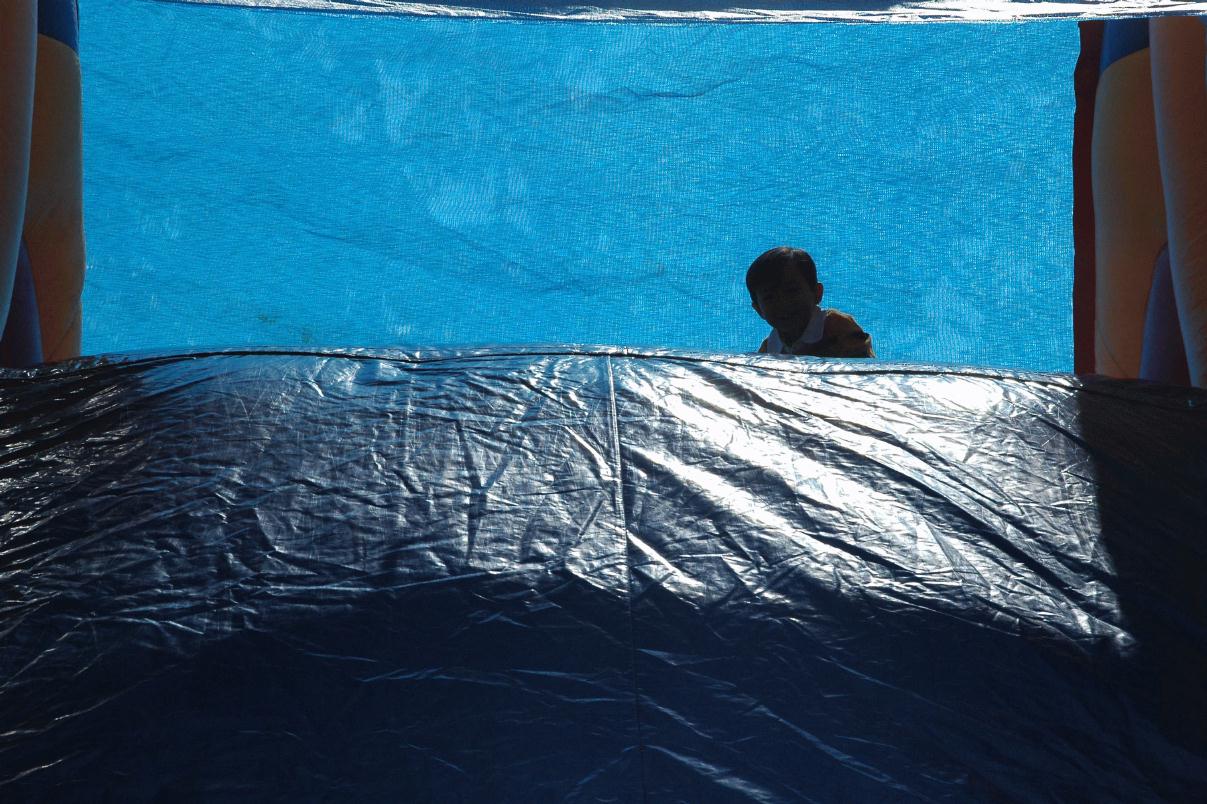 | |
|
Little Kenny knew better than to disobey his parents, but
the shiny toy was just out of reach. He pulled off his
life vest that was tethered to the boat and crawled to the
toy, a blue plastic fish.
The boat rose on a not-too-gentle swell which caused
Kenny to slip and fall overboard.
Kenny was under water. He opened his eyes and saw the underneath of the boat moving rapidly away. Kenny realized he was holding his breath and had to breathe. Kenny died. He sank from sight unable to feel the water getting colder and colder as he sank. Kenny crawled over a rise in pretend plastic water and slid down into a cavern filled with children. A girl a few years older than he was walked up to him and took his hand. "Hi," she said. "I'm Shelly and I drowned in 1952." Kenny sniffled. "I'm Kenny. I'm six." "What year is it? Is it still 2007?" Kenny looked around. He was surrounded as far as he could see by children. All, except Shelly, seemed to have vacant expressions on their faces. They all appeared to be wandering in slow motion. "What is that noise," Kenny asked. "Over here," Shelly led Kenny via a round-about path past the dazed looking children to the edge of the cavern. "Babies," said Shelly. "These are all the babies that have disobeyed their parents and drowned." "Why are they all crying?" "Wouldn't you?" Kenny started to cry. "I'd didn't mean to. I just wanted my toy. I really do what my parents tell me." "You're lucky," Shelly said and let go of his hand. "I speak English. If you walk that way too far," she pointed along the length of the cavern. "You find children that don't talk English." Kenny was miserable. He wailed, "It was just a toy." "What kind of toy, what did it look like?" Kenny stopped crying and tried to think. "I can't remember." "You see all these kids? Most of them went after a toy and drowned. But none of them. Not a one can remember what the toy was." Kenny started to cry again. The hopelessness of his situation was finally beginning to dawn on him. Someone pushed Kenny and he tumbled to the ground. "Hey!", he said. A hand on his shoulder shook him. Kenny opened his eyes and found himself in his bed on the boat. His mother sat over him. "Hello, sleepy head." Kenny sat up and grabbed his mother and wouldn't let go. "Mom," he shouted. "I will do every thing you tell me. Everything. I promise. I promise." "You're such a good son," said his mother and hugged him warmly back. On deck, a not-too-gentle swell caused a blue plastic toy fish to slip then fall overboard and sink. (2007) Octoberfest, Concord, California • Photo Posted Tuesday, October 23, 2007 • © 2007 Bryan Costales 
 #BP20071023.jpg Add a comment or report a mistake
|
|
|
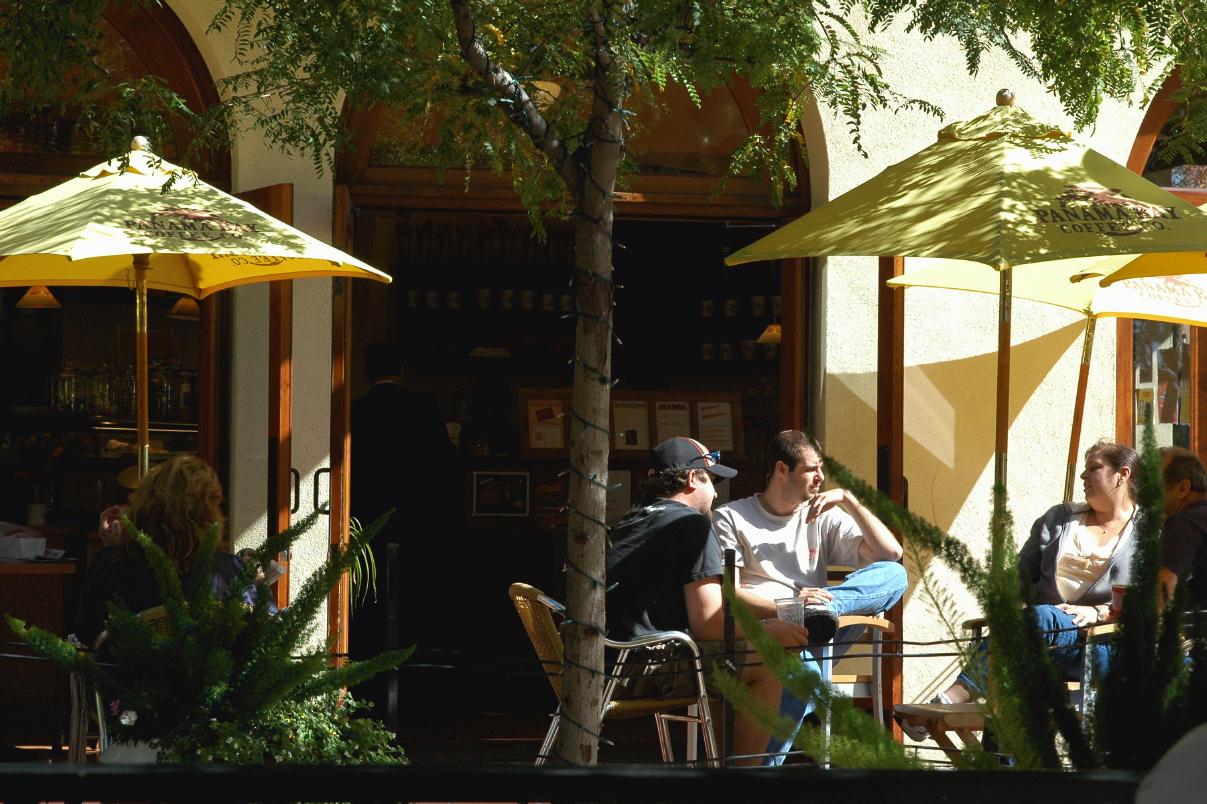 | |
|
Morgan Nelson lay on the gurney in the back of the
ambulance, his tummy on fire, his hands and feet numb,
and his head like a fuse-lit bomb. He thought back to
dinner and wondered why so many people would be poisoned.
The gang always met at Alphrado's after work Fridays for drinks, conversation the free bar food. Morgan was the first to arrive and heaped his plate with carrot sticks, celery and cheese sticks. A dab of Ranch dressing rounded his plate and he settled at an outside table to wait. The waiter came around so Morgan ordered a cranberry and vodka over ice. Jason and Ronda arrived the same time as his drink. "Did you see that biplane?" Ronda asked. "It seemed to be buzzing the town." She set her purse on the table. "Watch my purse while I grab some food." "Grab me a plate too," yelled Jason as Ronda moved inside. "Right," she called over her shoulder. "Look," Morgan said. He pointed up across the trees in the park. "It's that plane again." The biplane was heading straight toward them. It almost looked as if it was a crop duster. An almost invisible mist seemed to be falling behind it. "It's spraying!" Morgan said. "Look at that. A mist behind it." Jason was busy waving to Ronda to tell her to get Buffalo wings. "Buffalo wings!" he yelled. "It's going to pass right over us," Morgan sounded worried. "No, not cheese," Jason was becoming frustrated. "I'll be right back." Jason wove through tables to the inside to insure Ronda would bring him the correct food. The plane passed overhead and Morgan panicked. He covered his mouth and nose with his sleeve and looked around. He spotted a restroom just inside the door. He ignored Ronda's purse and rushed into the restroom. Inside he bolted the door and quickly soaked paper towels and covered his face with them. The ambulance hit a bump in the road. Morgan's eyes focused. "You're lucky," said the attendant leaning over him. "Sole survivor of a terrorist attack. Not bad." Morgan wondered what happened to Ronda's purse. He thought maybe he should go back and save it for her. His vision defocused again. Morgan lapsed into a coma and didn't awake for a week. "Why did you tell him that?" the driver called over his shoulder. "Why not tell him the truth. Someone dosed the paper towels in the bathroom with drugs." "Don't know," said the attendant in back with Morgan. "I just thought it would be funny." "You're sick," the driver said. "You're one sick dude." (2007) Concord, California • Photo Posted Wednesday, October 24, 2007 
 #BP20071024.jpg Add a comment or report a mistake
|
|
|
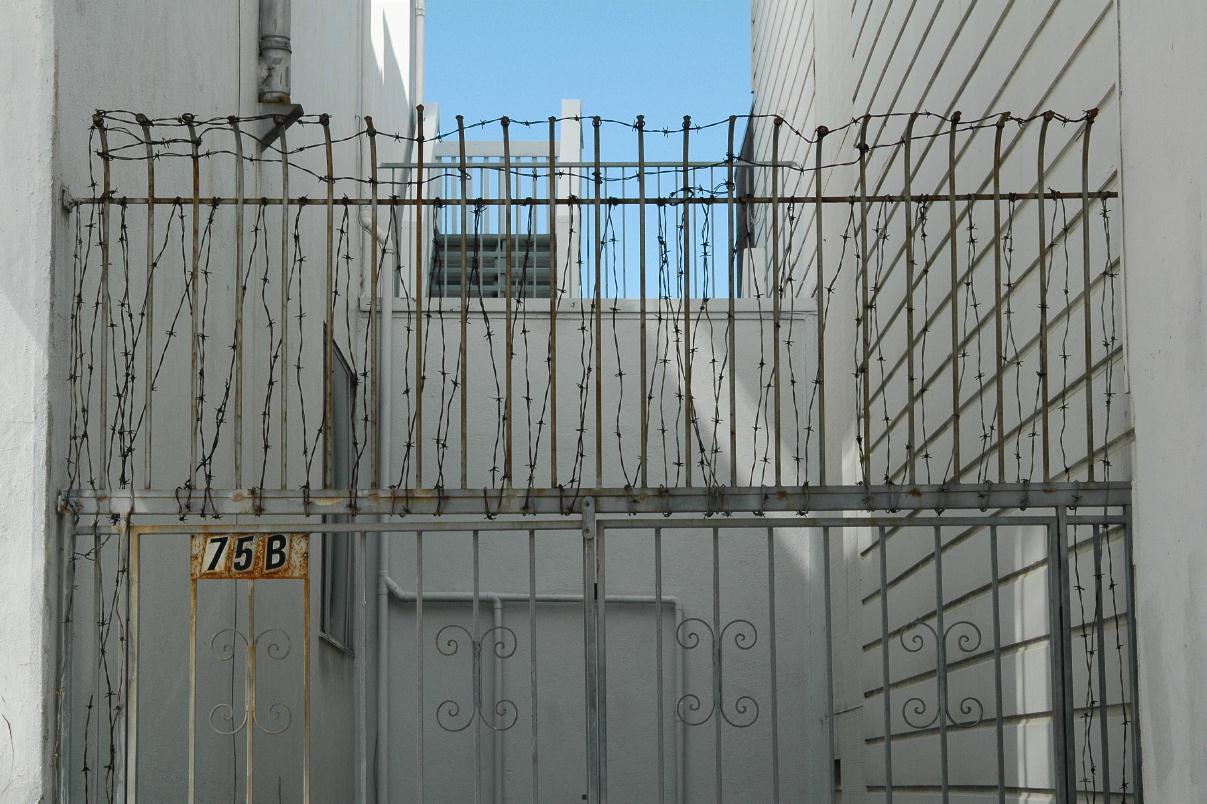 | |
|
The vandose was invented by science to control population
growth. The theory proposed held that if mankind could
no longer go out at night, the human population would
begin to decline. It was hoped that after 200 years,
the population would drop to a sustainable one billion
worldwide.
The vandose stood five feet tall, with long fast legs, huge sharp teeth, and an endless appetite. Their huge eyes kept them in hiding by day, but made them dangerous at night. They were created without sex organs so could never reproduce. Instead they were created with a life-span of 200 years. Vandose lacked arms, so could not climb, but in the first few years they proved too much for cats and birds. And, as predicted, the human population began to fall. Lastboy Fenton was ninety years old. His only sister had died two years earlier, so he was left alone. Their parents has walked out to be eaten by vandose fifty years before that. All Lastboy could remember of his mother was her litany, "Someday the sidewalks will once again bustle and jostle with people." Six months earlier, Lastboy's water-maker had broken. Since then, he needed to boil water by burning wood each day. To do that, he had been cannibalizing the inside of the house. The food synthesizer still worked by a means he could no longer remember, so he did not starve. True to his mother's dictate, Lastboy had been counting the days, months, and years. Last year had been the 200th year and all the vandose should have died. Indeed, for the last few months the nightly scratching on the outside of the house had been absent. In fact, Lastboy may have heard an owl hoot the other night. Lately Lastboy had taken to sleeping with his window nailed open a crack. A dangerous thing to do if vandose were still around. This morning, Lastboy looked at the vast scribbling that covered the walls and traced with is eye to today. It was January first of the 201st year. Lastboy grunted as he pulled on too-tight shoes. He hadn't worn shoes in years. With care, he hoisted his old frame to his feet and walked slowly to the door. "Maybe I should have champagne," Lastboy said. But he just shook his head then opened the door. Beyond the door was a short walkway, then the heavy steel barred gate topped with barbed wire. Lastboy twisted the knob and pulled the gate open. It wailed on rusty hinges and stopped not-quite all the way open. Lastboy stepped gingerly out onto the sidewalk. He looked left and right. In both directions the sidewalk, and the street, were all overgrown with weeds. In the distance he heard gulls cry. Lastboy turned and looked at his house. The address 75B. He tried to remember the name of the street but could not. Lastboy went back into the house and into his bedroom. He sat on his bed and pulled off the too-tight shoes. Lastboy leaned back and sighed. "Someday the sidewalks will once again bustle and jostle with people," remembered Lastboy. He laid back, his head on the pillow. Aloud, and to no one, Lastboy said, "Time for a nap." (2007) Noe Street, San Francisco, California • Photo Posted Thursday, October 25, 2007 • © 2007 Bryan Costales 
 #BP20071025.jpg Add a comment or report a mistake
|
|
|
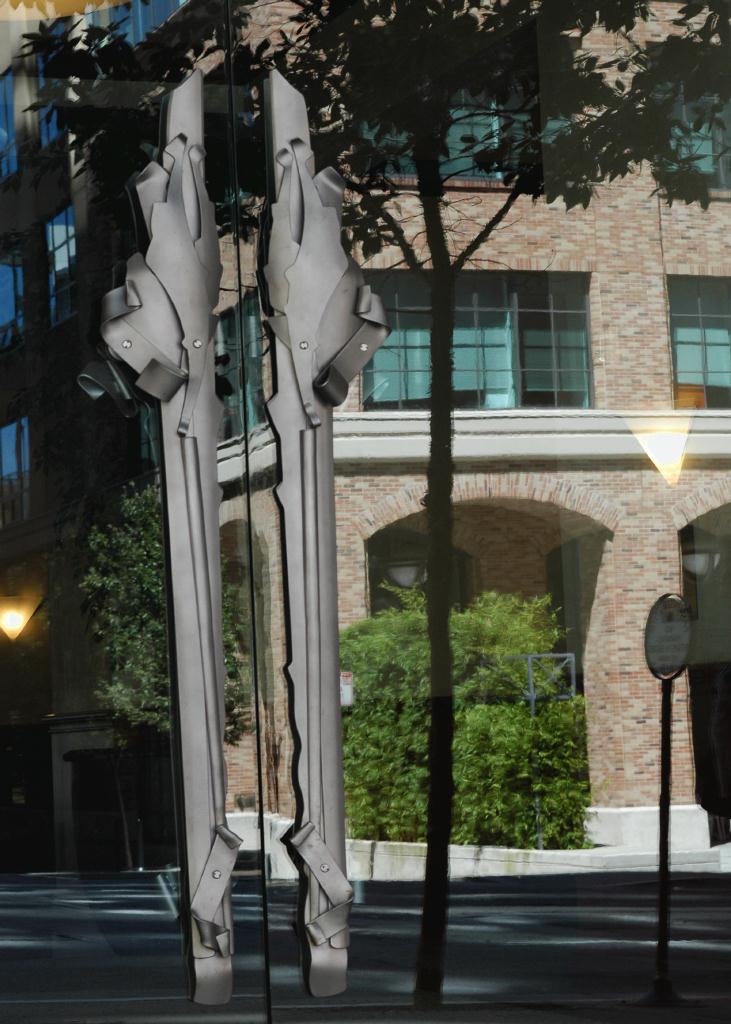 | |
|
Aggie Booth liked to gamble. Cards, horses, it did not
matter to him. Anything that involved a wager worked.
So Aggie was tickled to receive an invitation to a special
event for folks like him. The invitation was embossed in gold
on a stiff card and invited Aggie by name. Aggie smelled
the invitation and its odor reminded him of roses.
Aggie arrived outside the door precisely at the time specified. He double checked his watch, a gold Rolex, and saw that he had thirty seconds left in which to open the door and enter. The door was double doors made of mirrored glass with modern looking handles sculpted in elongated silver. Aggie touched a handle and felt a mild buzz in his hand. The door clicked and swung smoothly and silently open. Inside, it took a moment for Aggie's eyes to accustom themselves to the interior darkness. He glanced back at the door and noticed it was opaque and blocked all light. Aggie looked around. The room was long and empty of furniture. The floor was some sort of granite tile. At the far end of the room were three doors. Aggie walked calmly up to the three doors. They were identical. Each was standard door size, but almost flush with the wall and seemed to be made of some kind of metal. Aggie called out, "How do I wager?" The room remained silent. "Where do I place a bet?" Aggie waited and slowly became bored. At last he reached out to touch one of the doors. As he touched the door it became transparent like glass and exposed to him a view of the same hallway he just walked through. Aggie looked around and discovered himself in a tiny room with the only window the one he faced now. Aggie felt an odd sensation wash over him. It felt almost as if a part of him had died. Aggie shrugged the feeling off to nerves. Watching through the window Aggie saw himself walk through the doors at the far end. He watched himself walk up to the doors and ask how to place a bet. Aggie beat on the window and yelled. "Don't touch any doors." But the other Aggie on the outside ignored him. The other Aggie reached and touched a different door than the one Aggie was behind. The other Aggie disappeared. A voice boomed above Aggie. "You lose," it said. Aggie barely had time to consider what that meant before he was violently killed. Naturally the other Aggie felt an odd sensation wash over him. It felt almost as if a part of him had died. (2007) San Francisco, California • Photo Posted Friday, October 26, 2007 • © 2007 Bryan Costales 
 #BP20071026.jpg Add a comment or report a mistake
|
|
|
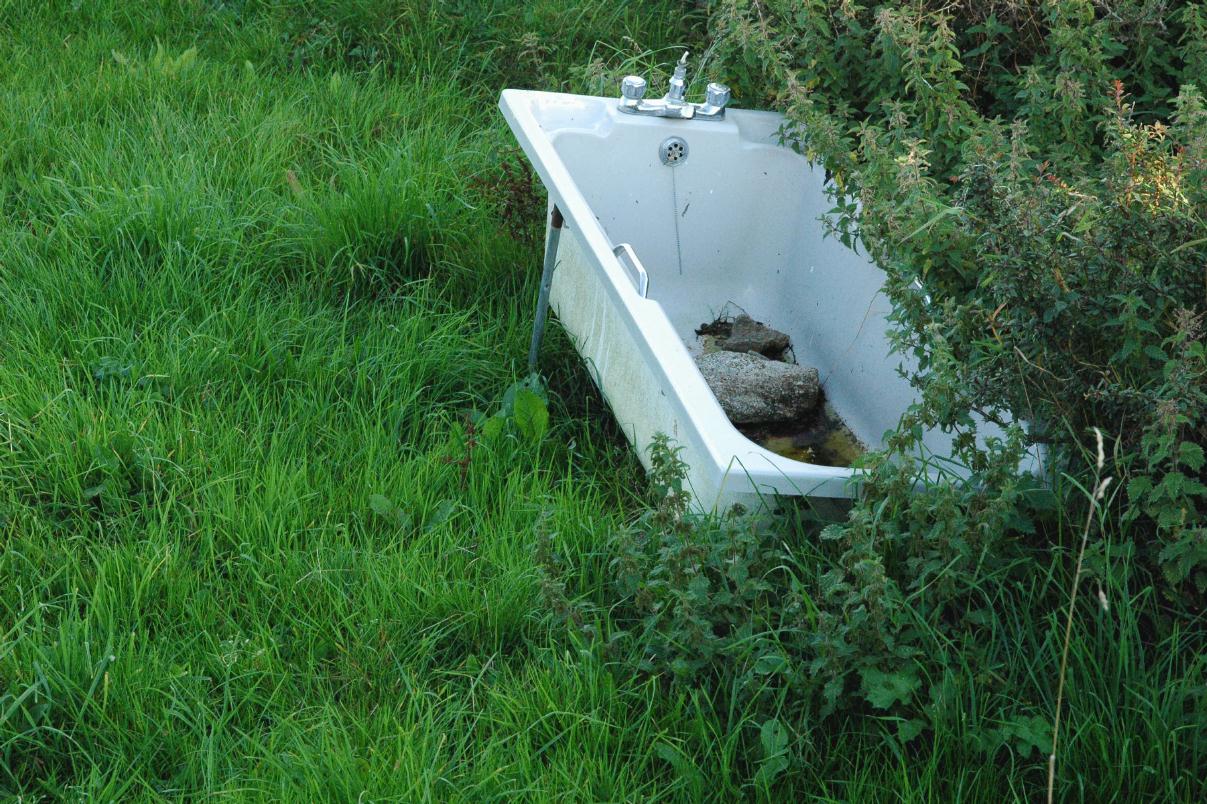 | |
|
Danny and Donny were brothers who liked to play pretend war games
in the fields behind the hotel. Their mother worked the front desk
in the hotel, and let them play after school when the weather was nice.
This day was much nicer than most. The sun was warm and the air utterly still. Not a single cloud was visible in the sky. For a moment, traffic on the road was absent and the field where the boys played was silent. A loud whistle and a louder thunk startled the boys. They dropped the sticks they were using as pretend guns and stood to look around. At the far end of the field, a bathtub had appeared. "Do you see that Danny?" Donny asked. "It's a bathtub," Danny said. The boys ran up to it and looked inside. The bathtub was empty except for a large stone, more like a boulder. The stone was egg shaped and rocked gently back and forth. "It's just a rock," Donny said. "No. I think its an egg," countered Danny. Danny reached in and tapped on the stone. The stone stopped rocking, then cracked open and a snake-like thing shot out and bit Danny on the hand. Both boys jumped back. "That stinks," Donny said and pinched his nose. "It bit me," Danny said. With a whoosh, the bathtub shot up into the air and climbed and climbed until it was gone. "Was that a space ship?" Donny asked. Danny examined his hand but could find no sign of a bite. "Maybe," he said. Their mother's voice called them to dinner. The two boys rushed inside and bubbled over with stories about the bathtub and the snake and the rock. Their mother, of course, didn't believe them. As time progressed, Danny became a straight A student. He learned to play chess and write essays. He graduated the University with honors and went on to win the Nobel Peace prize. Because of the thoughtful works Danny produced in his life, armies were disbanded and the world began to live in peace for the first time ever. Donny became the desk person at the hotel and continued to care for their aged mother until her death years later. At the funeral, the two middle-aged brothers stood together for a rare moment. "You think it was that snake bite?" Donny asked. Danny smiled. "Yes, Donny. I think it was that snake bite." (2007) Furbo, Ireland • Photo Posted Saturday, October 27, 2007 
 #BP20071027.jpg Add a comment or report a mistake
|
|
|
 | |
|
Pam was not born like most folks, from a mother and father. Instead, she
was hatched from a pumpkin. This is why, it seemed to her, all her
early photos showed her playing among pumpkins.
On her twenty-first birthday, Pam was enjoying an outing with her friends. They were exploring a corn maze when Pam became separated and lost track of the others. She wasn't worried. The sunshine was bright and warm and the corn maze quiet. Pam rounded a corner and happened upon a scarecrow. It stood staked to the ground dressed in a suit and tie. Pam looked at its painted face and thought it very handsome. So she reached out and took its stick hand. The scarecrow transformed magically into a real man. "Hello," he said. "My name is Jack." Pam and Jack became best friends, then lovers and eventually married. They lived, as Jack preferred, in the country rather than in the city. One Halloween, Pam was out for a drive with Jack. She said, "Jack dear. Don't you think it odd that we haven't had a baby yet?" Jack pulled the car to the side of the road and turned off the engine. "You never told me you wanted a child." "But darling, I thought you knew. Didn't I give off the right signals?" Jack frowned, then opened the door and got out. "Come with me," he said. Pam joined him, and hand-in-hand they crossed the road to a pumpkin patch. "Choose a pumpkin," said jack. Pam pointed at one in the middle of the pile. "That one please." Jack waded carefully to the center of the pumpkins. Bent and touched the one Pam had chosen. "Remember," he said as he stood up straight. "I have loved you always and will love you forever." The pumpkin Pam had chosen cracked loudly and split open. A lovely child crawled out. The child looked at Pam and said, "Mama." Pam almost wanted to cry. Pam's new daughter looked up at Jack and said, "Papa." That word resonated through Jack and, in an instant, turned him back into a scarecrow again. His painted face sad. Pam took her new daughter home and never, ever told her she was hatched from a pumpkin. Pam wanted her daughter to meet and love a real man. She named her daughter Sally. Pam kept the scarecrow in the living room nailed to the wall like art. Whenever she was alone with it, she would kiss its painted face and hold its stick hand. She wished, with all her might, she could one day change that painted frown into a smile, but never could. When Sally was eight, she walked up to her mother in the kitchen and said, "Please don't tell me I'm in trouble." "Why, what did you do?" Sally took her mother's hand and lead her into the living room. "I couldn't stand that face for another day," Sally said. "Please don't tell me I'm in trouble." Pam looked at the scarecrow on the wall and marveled at what she saw. Sally had used paint to change the frown into a smile. It wasn't a perfect job, the paint was smudged and a drip ran down his cheek. "No," said Pam. She squeezed her daughter's hand. "You're not in trouble. Not in trouble at all." Bernal Heights Festival, Cortland Avenue • (2007) San Francisco, California • Photo Posted Sunday, October 28, 2007 • © 2007 Bryan Costales 
 #BP20071028.jpg Add a comment or report a mistake
|
|
|
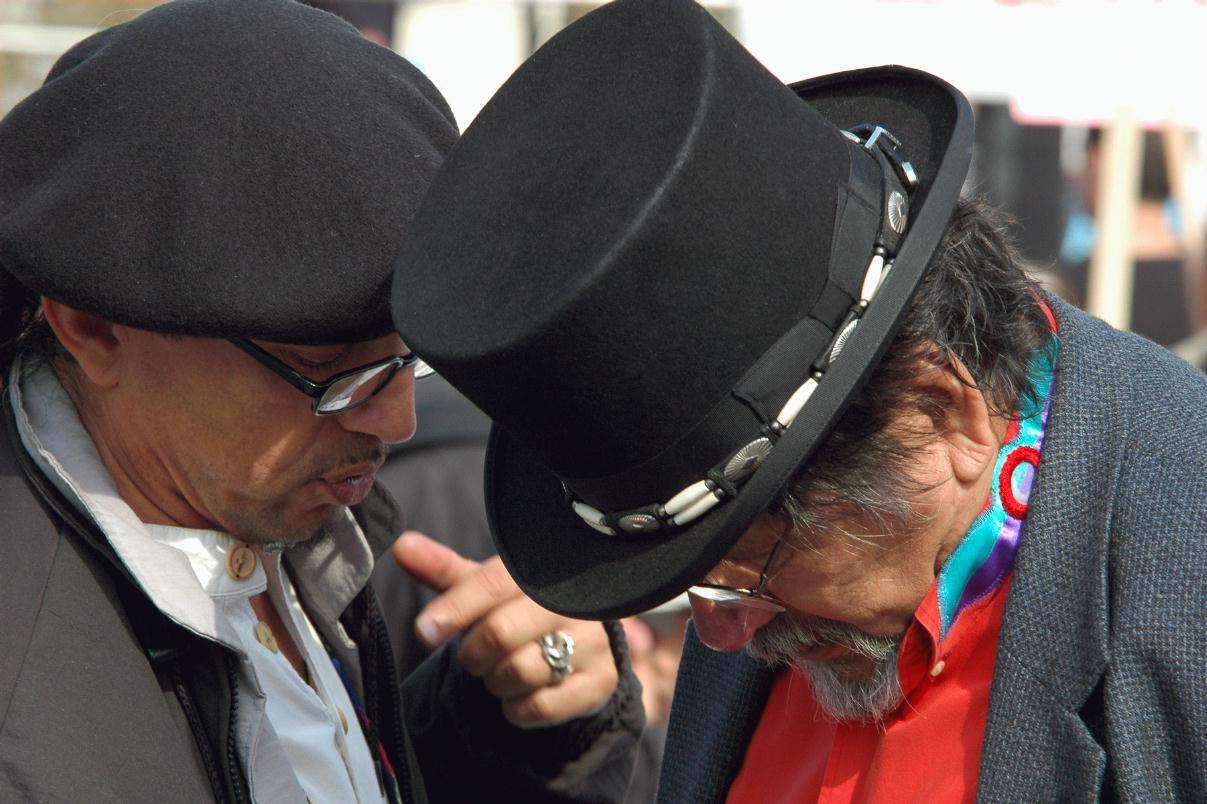 | |
|
"I have in my pocket, a little pill that will make you young again," whispered the old man
in the black top hat.
"But," François leaned closer and whispered back, "If that is so, why do you still look so old?" "Would you trust me if I looked like a young man?" "A little youth? Yes, I admit, a little youth would help. Something to show me that this pill of yours actually works." The old man pulled a couple pieces of paper from his pocket and carefully smoothed them. "Here," he held the first for François to see. "A newspaper clipping from 1890 showing me the same as I look today." François looked at the clipping, then at the old man's face, then at the clipping again. "It does look somewhat the same." "That's me when I had just taken the first pill. I grew young, into my twenties, then started to age again." The old man produced a second slip of paper. "My original birth certificate." François peered at the faded yellow paper. It showed a date of 1792. The old man slipped the papers away to an inner pocket, careful that no passer by would see them. "This time I got two pills. They only last a little while before oxidizing away. So I thought to myself, why not help some random stranger." "And you chose me?" "Exactly." "What's this miraculous pill of yours going to cost me?" The old man straightened and smiled at François. "Not a one thin dime." "Okay," François said. "Let me have it." "You'll just take a pill from a stranger?" François laughed. "I've done worse. Lots worse." The old man produced a plastic bottle of water and a small gold box with strange writing on it. He opened the box with a minor flourish. "Voila," he said. Then he took one pill and handed it to François, and popped the other in his mouth. "Thanks," said François. He watched the old man drink down the pill then popped the other in his mouth and glugged it down using the same bottle of water. "Do they do that every day?" the new nurse asked. "Regular as rainwater," the permanent nurse replied. "No sooner do I hand out the meds than they put their heads together and conspire." "What do they say?" "I have no idea. I tried to overhear once, but they caught me. They have leaned close and whispered, like that, ever since." (2007) Oct. 27 San Francisco War Protest • Photo Posted Monday, October 29, 2007 
 #BP20071029.jpg Add a comment or report a mistake
|
|
|
 | |
|
Hans Deilich had been an engineer with AMTRAK years before.
The train he'd been driving on the Sacramento to Oakland
run struck a car in an intersection and killed the woman
inside.
Hans retired from the railroad and swore to himself he would never operate a train again. But one can seldom resist one's true calling, and Hans was no exception. In his sixties, Hans worked again driving a train, but this time at the San Francisco Zoo. The small train couldn't move all that fast and could stop on a dime. He lost his fear of hitting someone, and over time, began to love his job again. Hans arrived at work early to oil and tune the little engine. He always did a test run before the Zoo opened so that he could inspect the tracks. Hans could not know that a peahen had nested on the track over night. The little train came round the corner and ahead Hans spotted the peahen. He sounded his whistle and hit the breaks. The little train screeched to a halt in a cloud of steam. Hans jumped out and frantically looked for the peahen. The bird had abandoned the nest and stood well off from the tracks looking startled. Hans dropped to his hands and knees and peered under the train. He was relieved to see that there were no eggs in the nest yet. Hans stood and wiped his hands on his pants. He smiled. Yes, Hans was once again working in a job he loved. (2007) "Little Puffer", San Francisco City Zoo • Photo Posted Monday, October 1, 2007 
 #BP20071001.jpg Add a comment or report a mistake
|
|
|
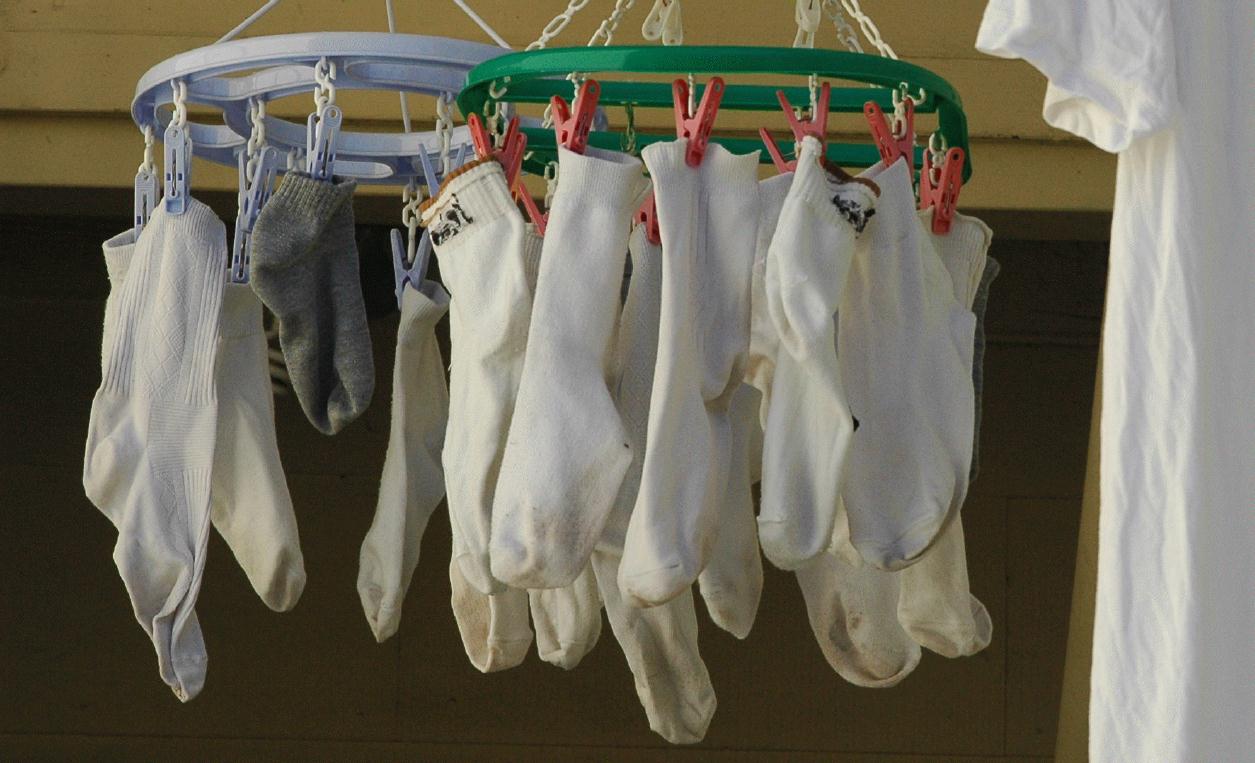 | |
|
Some say that when evil magic runs its course, beneficial
magic remains.
Wona Huevo worked days in a small back-room downtown. She spent her days sewing "Made in U.S.A" labels on imported garments. She always looked forward to her trip home to see her son. She and her son lived with her mother in a cheap apartment building a train-ride from town. Wona's son, Don, was an adult but with the mind of a child. He always was so happy when his mother came home he could do nothing more than make his mother just as happy. On her way home that Friday afternoon, Wona found a clean gray sock on the ground. She looked up and, high up among the converted condos was a clothes line. "It must have fallen," she said. Wona caught the evening train home and idled her time on the ride sewing buttons to the sock to make her son a sock puppet. Dr. Ranji pulled his laundry in through the window. He was dismayed to discover one of his gray socks missing. "Damn kids," he growled and glared at the single remaining sock. Dr. Ranji was a magician of the old school. Not only did he own a condo on the top floor, but he also leased a work-room in the basement. It was in this work-room that Dr. Ranji performed his magic. Dr. Ranji tossed the sock in a bowl then rubbed his chin thoughtfully. "Hmm." He grabbed various ingredients from shelves that lined the walls of his work-room. "Hmm." Wona arrived home as usual shortly before her son's bedtime. Don smiled as she entered the room. Wona hugged her son then sat on the bed next to him. "Look what I made for you," Wona said. She pulled the sock puppet onto her hand. Dr. Ranji snapped his fingers. From a box under the table he pulled a dead snake. Mumbling the appropriate words, he tossed the snake into the bowl with the sock. Don watched his mother put the sock on her hand. Then the strangest thing happened. His mother's hand turned into a big snake. It hissed and bared its fangs. Its eyes were huge and glowed red. Don wailed in fear. "What's wrong," Wona said. "Don't you like the sock puppet?" But her son only wailed louder and tried to back away in fear. Wona pulled the sock from her hand and threw it on the floor. "There, its gone." Don's eyes cleared and he scooted forward. He took his mother's hand and began to kiss it. Dr. Ranji didn't like what he'd done. It didn't seem like enough. "Those damn kids." Wona picked up the sock and looked at it. It just looked like a sock to her. She carried it out onto the back balcony that overlooked the train tracks. With a throw that would make a professional baseball player envious, Wona threw the sock as far away as she could. Dr. Ranji snapped his fingers again. He pulled a set of dead bat's wings from a jar and tossed them into the bowl. Over the train tracks, the sock sprouted wings and flapped its way back to the city. Dr. Ranji needed something else. He scratched his head. The sock landed on the clothes line outside Dr. Ranji's condo. Dr. Ranji, his hands behind his back, began to pace, circling the table. High above, the sock too began to circle the clothes line. Then Dr. Ranji said, "Fire!" Dr. Ranji mixed two powders and tossed the result into the bowl. A flash of fire and smoke rose from the bowl. High above, the sock coughed fire. Like a small dragon it set fire to the clothes line. Then it coughed harder and burst into flames itself. The fire burned its way up the rope and into Dr. Ranji's condo. Dr. Ranji heard the fire alarm and, following standard fire rules, joined the other residents on the sidewalk outside. He looked up and was amazed to see that only one condo was on fire. It was his own. In the basement the bowl with the snake and bat's wings also burst into flames. In short order the entire basement was on fire. Saturday was uneventful. Dr. Ranji stayed with his sister in her place near the park. On Sunday afternoon Dr. Ranji was arrested for arson. Monday morning Wona had to bring her son with her to work. She did that every Monday because her mother had therapy that day. Wona lead her son past a condo building that was closed and covered in yellow "Caution" tape. On the ground, Wona found two buttons. She picked them up and thought they looked an awful lot like the buttons she had used to make the sock puppet. Don said, "Can I?" Wona gave the buttons to her son. He smiled and put them in his own pocket. The buttons were the cinder of a burned dragon. Don carried with him the spent magic of evil, and evil so great that its remains became strongly beneficial. Over the next year, Don healed in ways that would, at first, amaze only his mother, and only later, would amaze and then also heal the world. (2007) Bernal Heights Fiesta, San Francisco • Photo Posted Wednesday, October 31, 2007 • © 2007 Bryan Costales 
 #BP20071031.jpg Add a comment or report a mistake
|
|
 |
| home • contact • topic guide • top 25 • photos • video • writing • blogs • upload • terms • privacy |